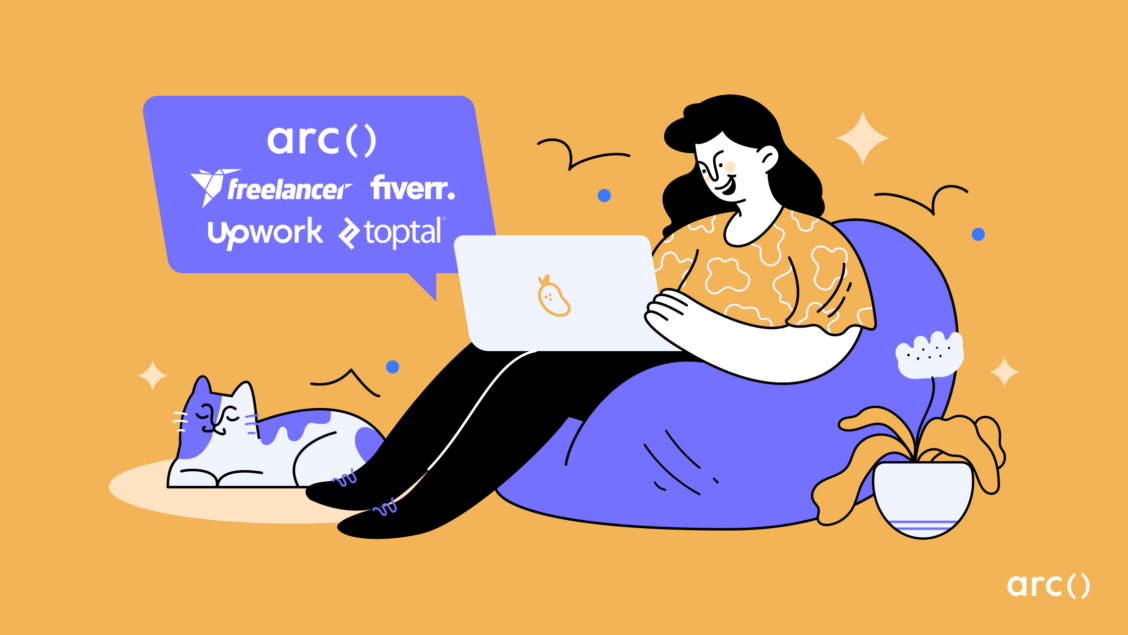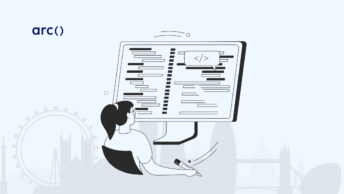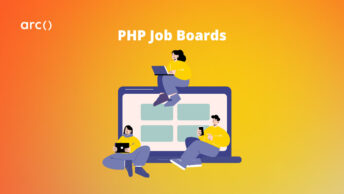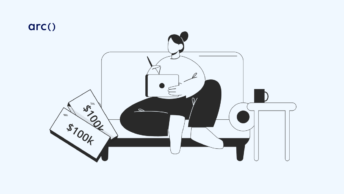Freelancing is growing fast, but landing jobs on popular platforms is getting more competitive. With about 1.57 billion freelancers globally, it’s even more challenging for newcomers to land their first gigs.
The best freelance websites benefit both freelancers and clients. That’s why we’ve compiled a list of the 29 top freelance websites to make finding freelance work easier. Whether you’re an experienced freelancer looking to expand your portfolio or a newcomer seeking your first gig, these platforms will help you grow.
Find your dream remote job faster with Arc.
- Development, design, and marketing roles
- US-based startups and tech companies
- Choose freelance or full-time remote work
Work from anywhere in the world on your terms.
Join Arc now →
The 29 best freelance websites
1. Arc

Arc connects remote developers, designers, and marketers with top startups and established tech companies. With tailored support and a rigorous vetting process, Arc helps you stand out and land high-quality opportunities.
Pros:
- Proven record of quality jobs, with 4.2K+ successful matches made
- Strong earning potential, with $45M+ earned by freelancers
- Quality curated freelance and remote jobs from top companies
- One-on-one coaching and support throughout your job search
- AI matching with HireAI for more relevant opportunities for you
Cons:
- A historically developer-focused platform that has recently expanded to other roles, though opportunities in some fields may be more limited
- Primarily focused on remote roles, so limited onsite options
Unique features:
- Get job matches tailored to your profile and talk directly to hiring managers
- Earn above-market pay solving challenging problems at global companies
- Gain a competitive edge and stand out to companies by getting vetted for communication and expertise
- Get personal support from Arc talent partners throughout your job search, interview, and negotiation process
What freelancers are saying:
“Arc made finding remote roles straightforward and put me in touch with hiring managers quickly.” — Daniel Kakutani, Senior Software Engineer @ Nasc Technologies
“The pay is great, often higher than what I’ve seen on other platforms.” — Eduardo Sirangelo, Senior Software Architect @ Carebook Technologies Inc.
Start your freelance journey with Arc
Ready to find your next project? Sign up on Arc for exclusive roles in development, design, marketing and more with personalized support to help you succeed!
2. Upwork
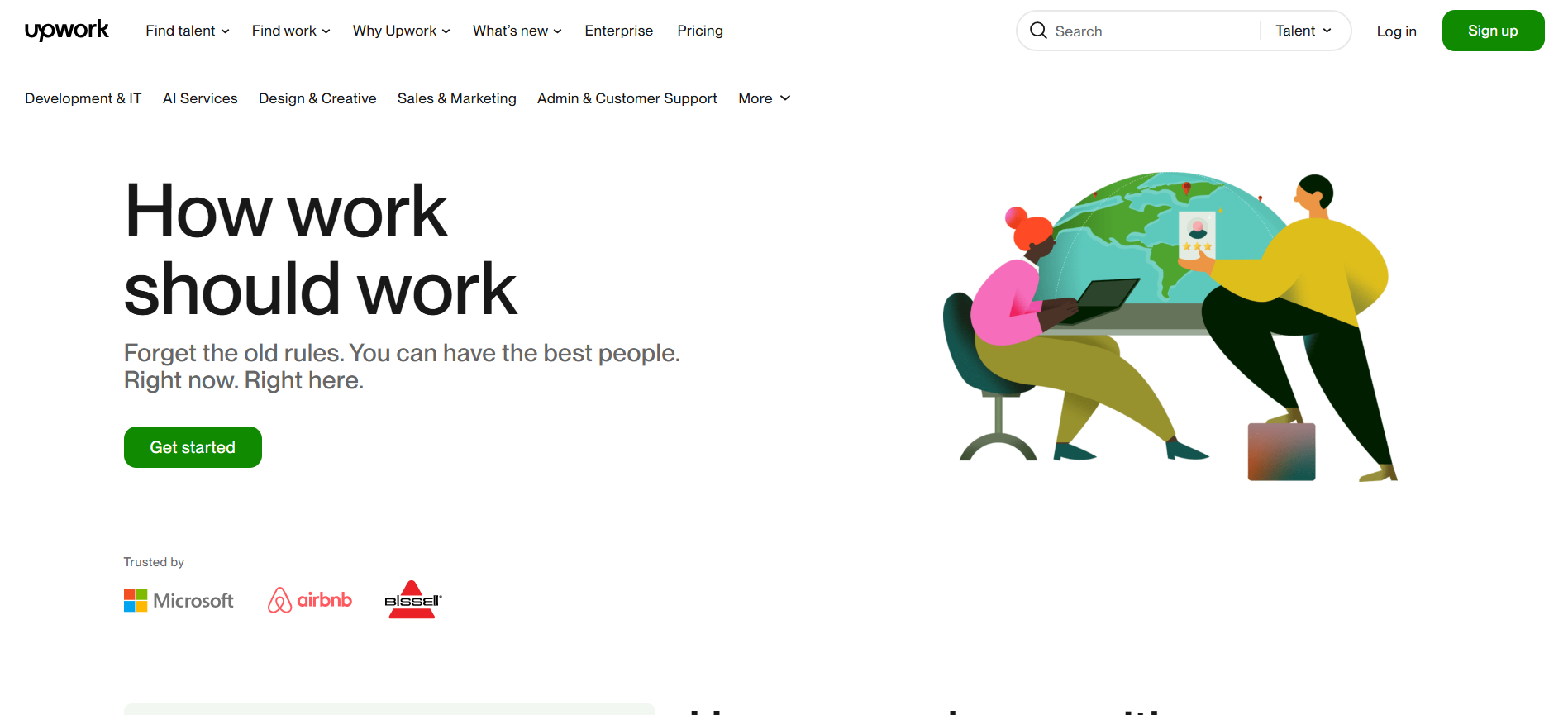
Upwork lets you set up portfolios and apply for remote jobs. To apply for gigs, you’ll need Connects, which acts as Upwork’s proposal currency.
Pros:
- Flexible short-term and long-term projects
- Choose from hourly and fixed-price projects
Cons:
- 10% service fee and an instant connection fee for direct offers
- Tough competition due to the large number of freelancers
- Each job requires multiple Connects, which freelancers need to purchase if they run out of their monthly allocation of 10 Connects
Unique features:
- Work Diary to track billable time for hourly jobs
- The Upwork Chat Pro feature improves communication between freelancers and clients using AI
What freelancers are saying:
“Upwork made getting started so easy that if it wasn’t for Upwork, I probably wouldn’t have given freelancing a try. And my wife and I wouldn’t have been able to move out of Serbia.” — Mateja M., Designer
3. Toptal
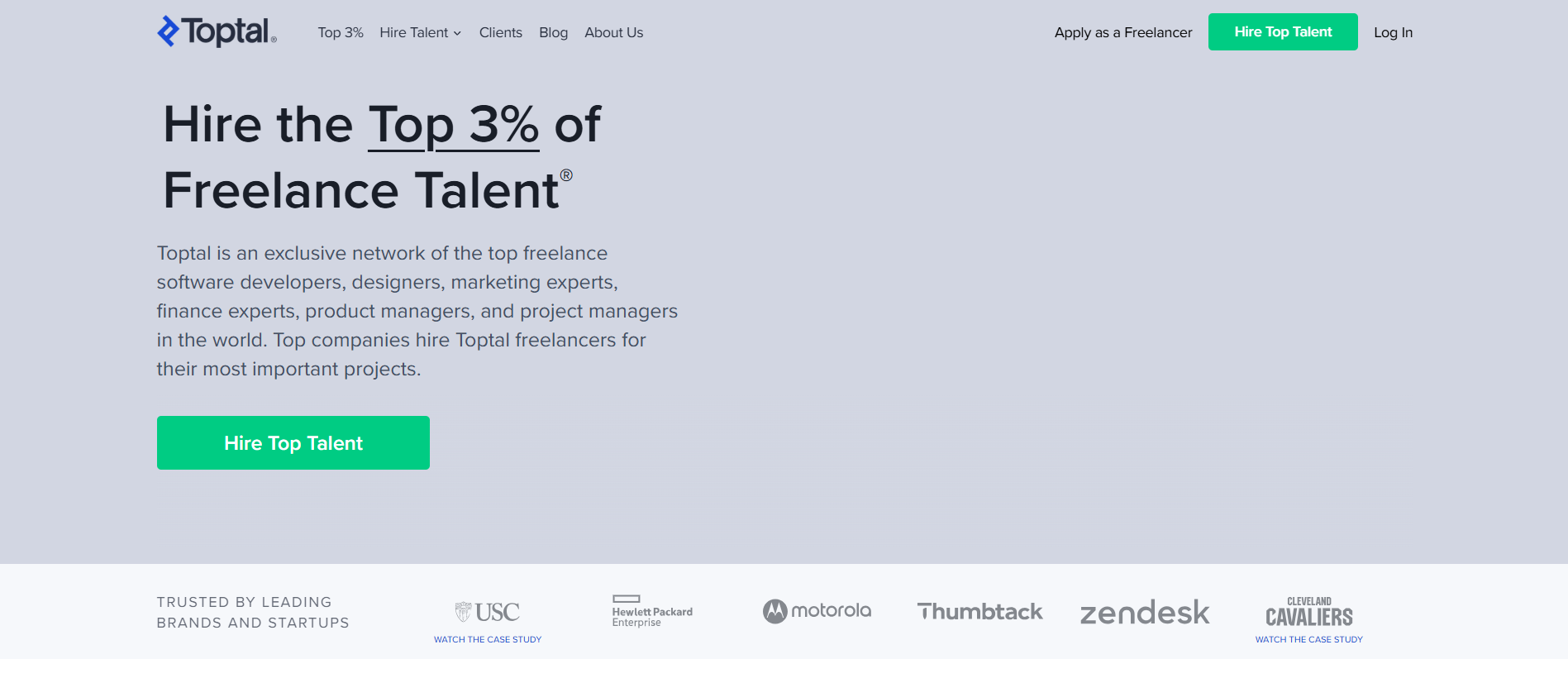
Toptal connects you with businesses across different fields. Its vetting process gives you a competitive edge, but only seasoned professionals are accepted, which may limit your chances of landing gigs.
Pros:
- Access to high-quality projects
- Opportunity for long-term relationships with clients
Cons:
- Limited flexibility due to long-term projects
- Difficult to get accepted due to strict screening
- High competition from elite professionals on the platform
Unique Features:
- Focus on building lasting relationships with clients
- Trusted for high-stakes projects, giving you credibility as a freelancer
What freelancers are saying:
“Working for Toptal has been a career booster. After a year and some months of being part of the Toptal community, I feel that I can take any project in any language or technology. Toptal gives you the tools to face any challenge, technical or not.” — Nicolas Mengual, PHP Developer
4. Fiverr
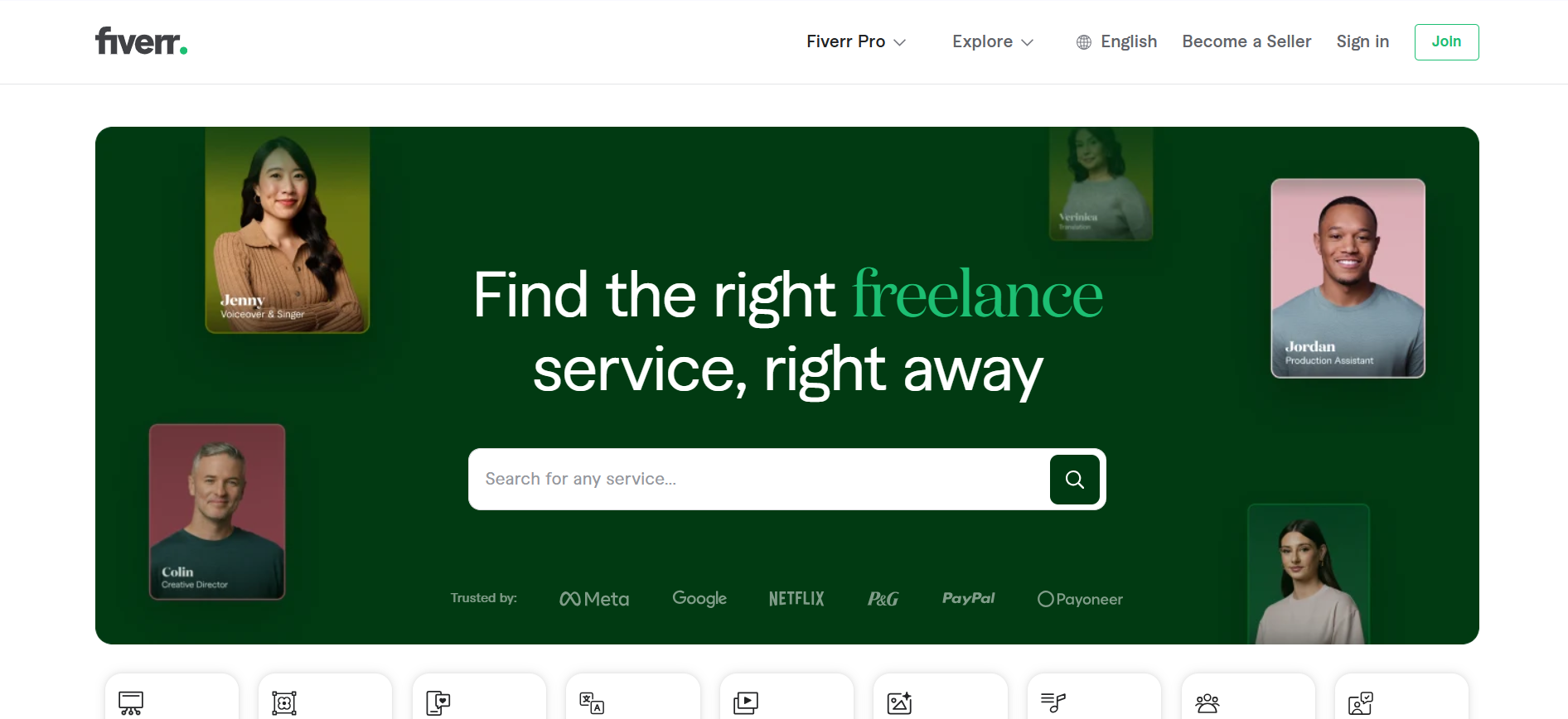
Fiverr is a freelancing platform where you create gigs on your own terms. Clients browse and reach out to you directly, but you can’t apply for jobs yourself.
Pros:
- Easy-to-use platform with a straightforward gig system
- Flexibility to offer upsells and create custom packages
- Freedom to set prices and work on quick, small projects
Cons:
- 20% service fee reduces overall earnings
- Focus on affordability may lead to lower pay rates
- Established freelancers often dominate the search results
Unique features:
- Freelancer levels based on performance and customer feedback
- Gig-based model designed for quick transactions and fast deliverables
- Ideal for those seeking projects with clearly defined scopes
5. Designhill

Designhill lets you join design contests, work on one-to-one projects, and offer custom services. You can also sell your artwork through its PrintShop feature.
Pros:
- Access to multiple design ideas through contests
- Specialized freelance platform reduces competition
- Opportunity to connect with other designers
Cons:
- Designers are only paid if their design wins the contest
- Potential for unpaid work when participating in contests
Unique Features:
- Submit contest-based entries for multiple creative opportunities
- Choose between crowdsourcing or direct hire projects
What freelancers are saying:
“I can pick and choose what kind of logos or design projects I wanna work on and it allows me to be creative.” — Carlon Young, Designer
6. We Work Remotely
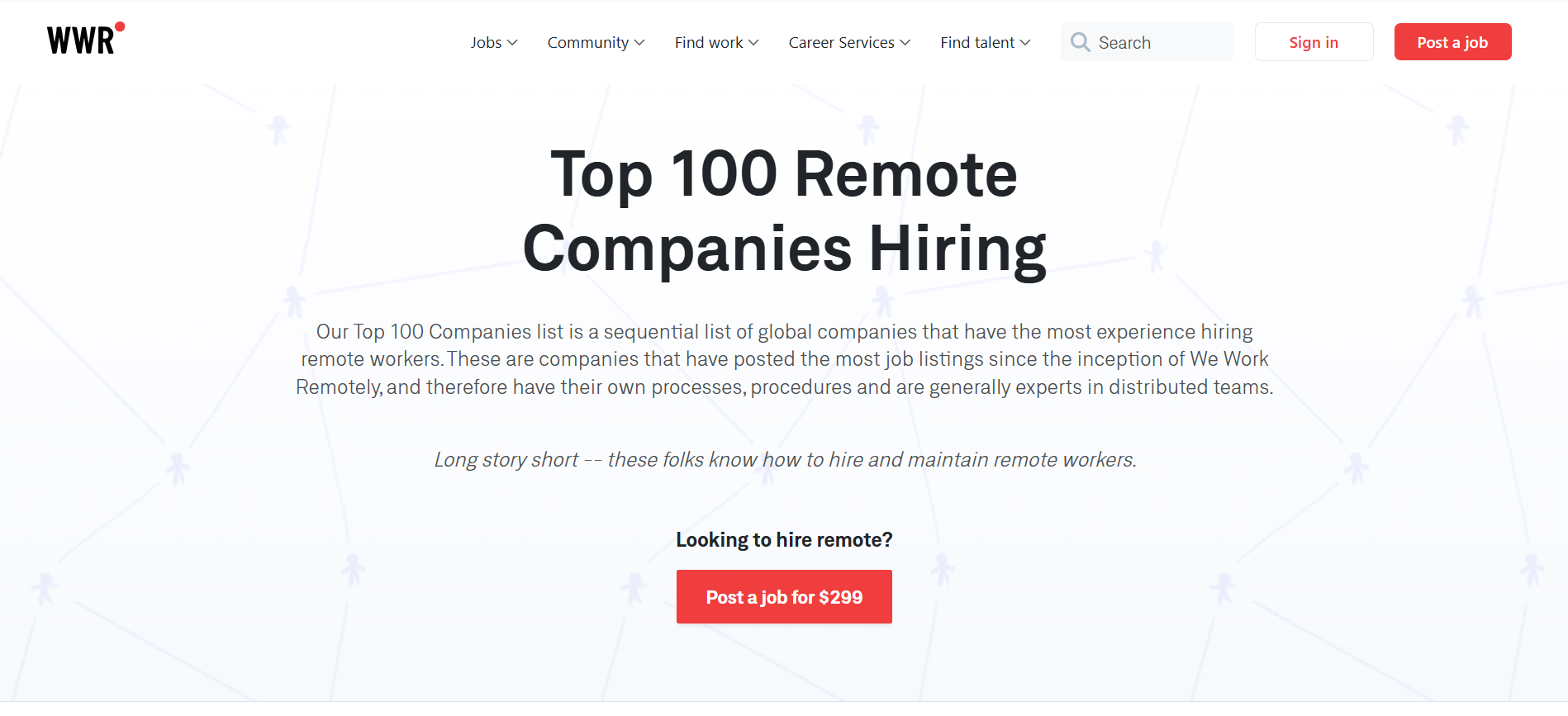
We Work Remotely is a job board focused solely on remote jobs. You can browse listings and apply for free, making it easy and accessible for anyone seeking remote work.
Pros:
- High-quality list of remote job offers
- Simple and easy-to-use platform
Cons:
- No automatic matching for jobseekers
- No options to set working terms for freelancers
Unique features:
- Direct job listings from employers without middlemen
7. Behance
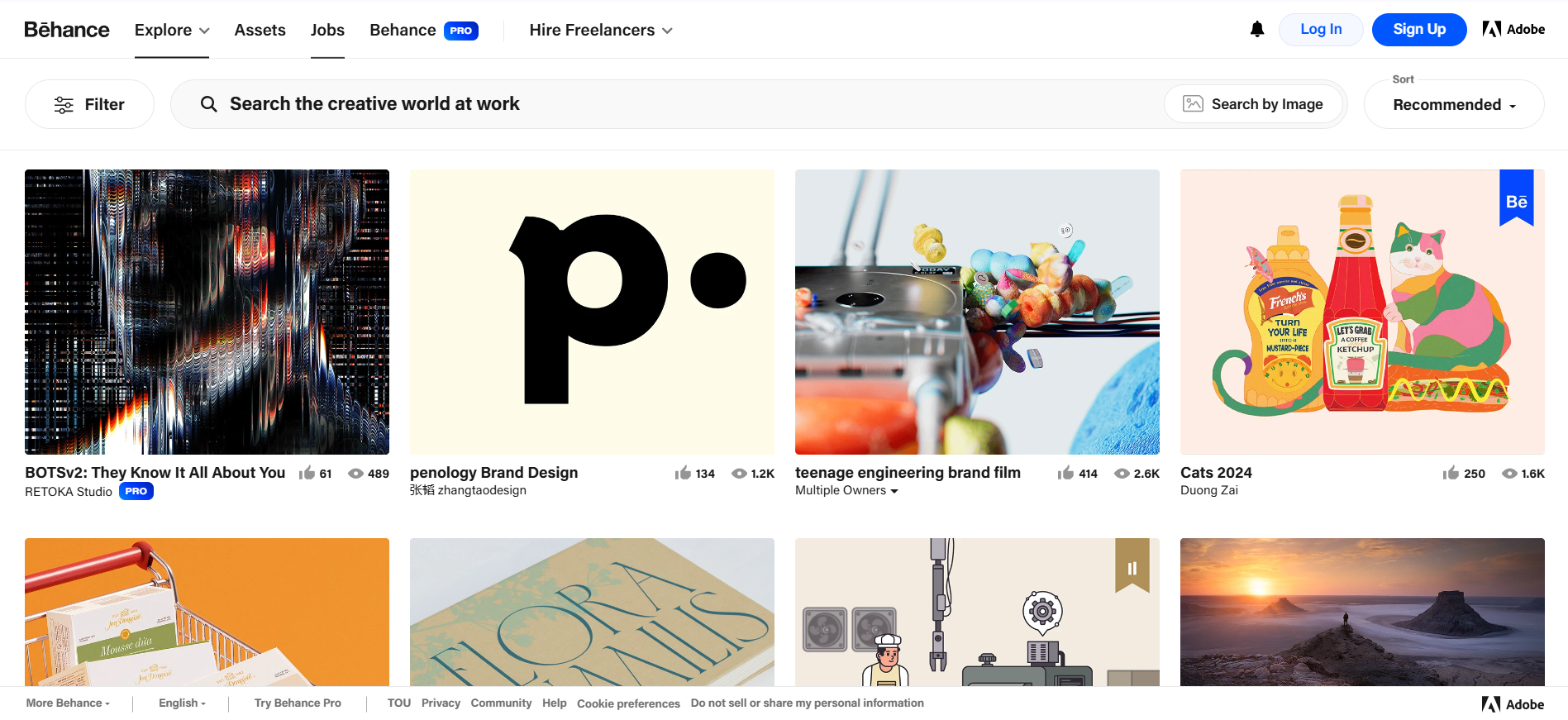
Behance lets you showcase your work, connect with other creatives, and find job opportunities all in one place. With advanced analytics, you can see who’s viewing your portfolio and use those insights to fine-tune it for your audience.
Pros:
- Broad reach and integration with Adobe’s creative tools
- Ideal for building a personal brand and showcasing creative work
- Community-driven, with chances for feedback and collaboration
Cons:
- It’s competitive, making it hard to stand out
- Freelancers need to upload new work regularly to stay visible
Unique features:
- Built-in tools for easy project discovery
- Connect directly with potential clients worldwide
What freelancers are saying:
“Best thing about Behance is that it has a clean and professional way for showcasing my portfolio. Also it has amazing creative work across various fields which helps in finding inspiration for my work.” — Siddhant P., UI/UX Designer
8. SimplyHired
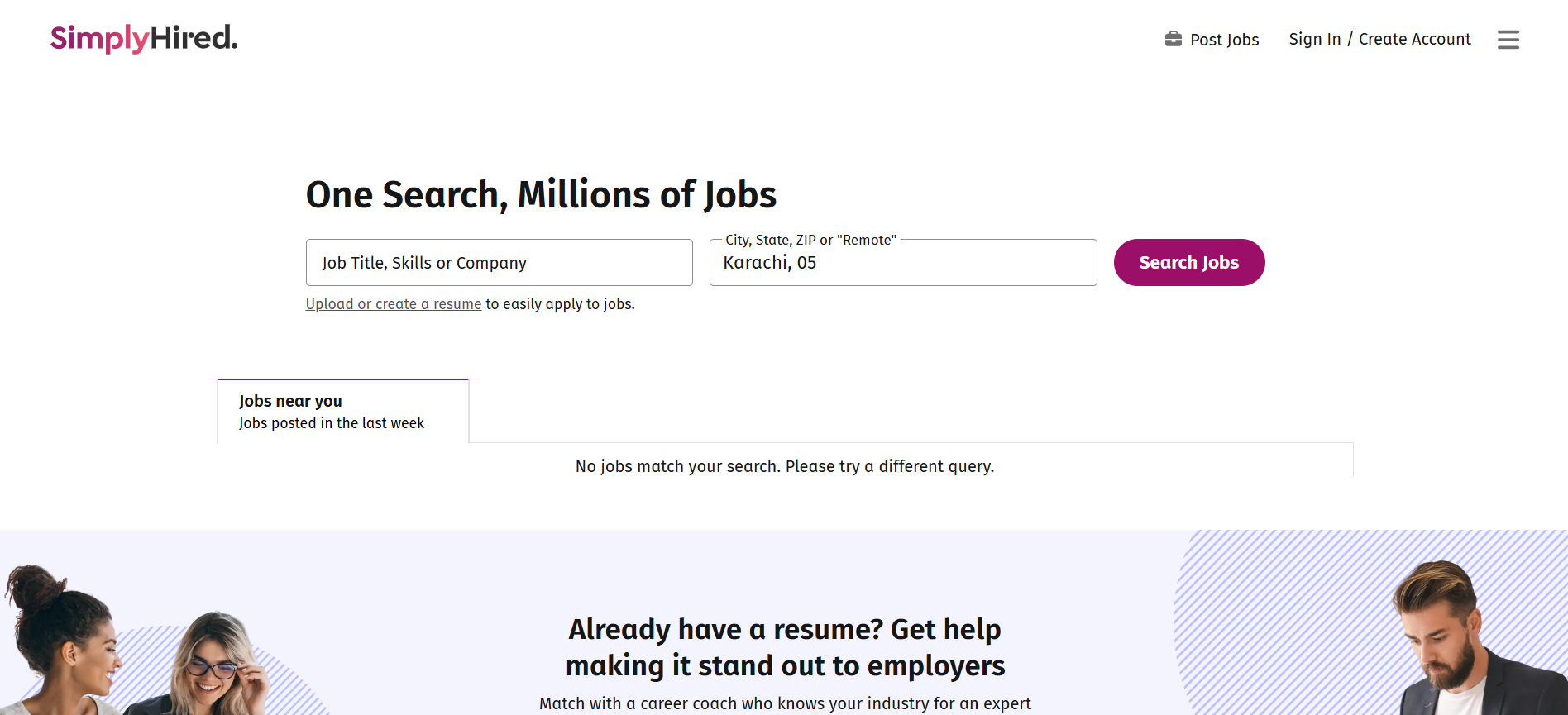
SimplyHired is a job search engine that gathers job listings from company sites, job boards, and staffing agencies across various industries, including freelance work. Its salary estimator helps you find fair pay ranges for specific roles and locations.
Pros:
- Aggregates many job listings in one place
- Easy-to-use interface with many job categories
Cons:
- Often redirects users to third-party sites to apply
- No personalized job-matching feature
Unique features:
- Comprehensive collection of job listings, serving as a one-stop shop for job seekers
- Ideal for both freelancers and contract work
What freelancers are saying:
“Awesome site. Finding my job here was really simple. I would highly recommend it to others.” — John P., Remote worker
9. Dribbble
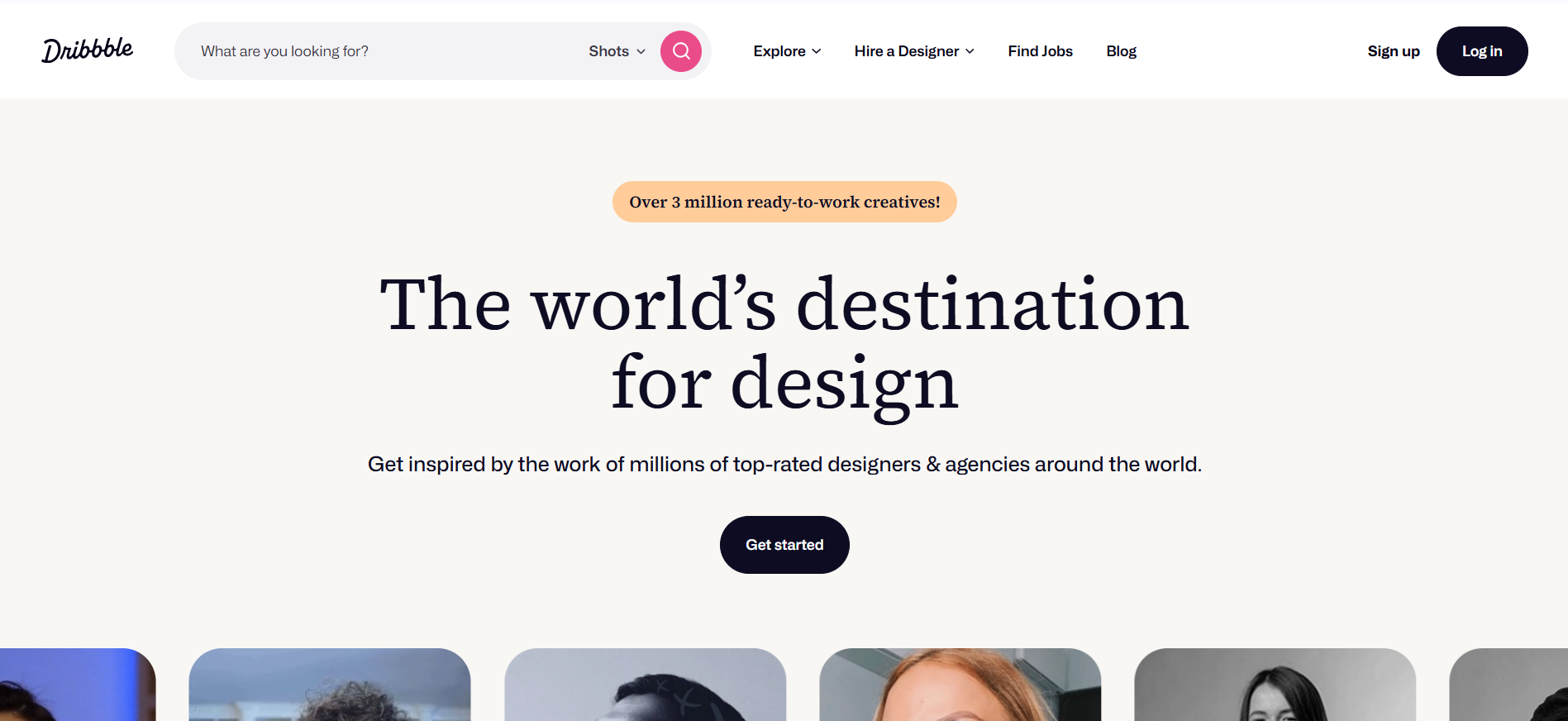
Dribbble is a platform for designers in UI/UX, graphic design, and illustration. It works as both a portfolio site and a job board, helping you connect with potential clients and employers.
Pros:
- Specialized for design professionals
- Encourages community interaction with feedback and engagement
- Focused audience of design professionals and businesses
Cons:
- Premium features like job visibility require a paid subscription
- Very competitive, making it tough to stand out without a strong portfolio
Unique features:
- Opportunities to network with a focused design community
What freelancers are saying:
“Dribbble helps me a lot to find creative design ideas for my Graphic Design projects. It also helps me to create my personal portfolio to showcase my daily design work.” — Nayem Nawaf, Designer
10. PeoplePerHour
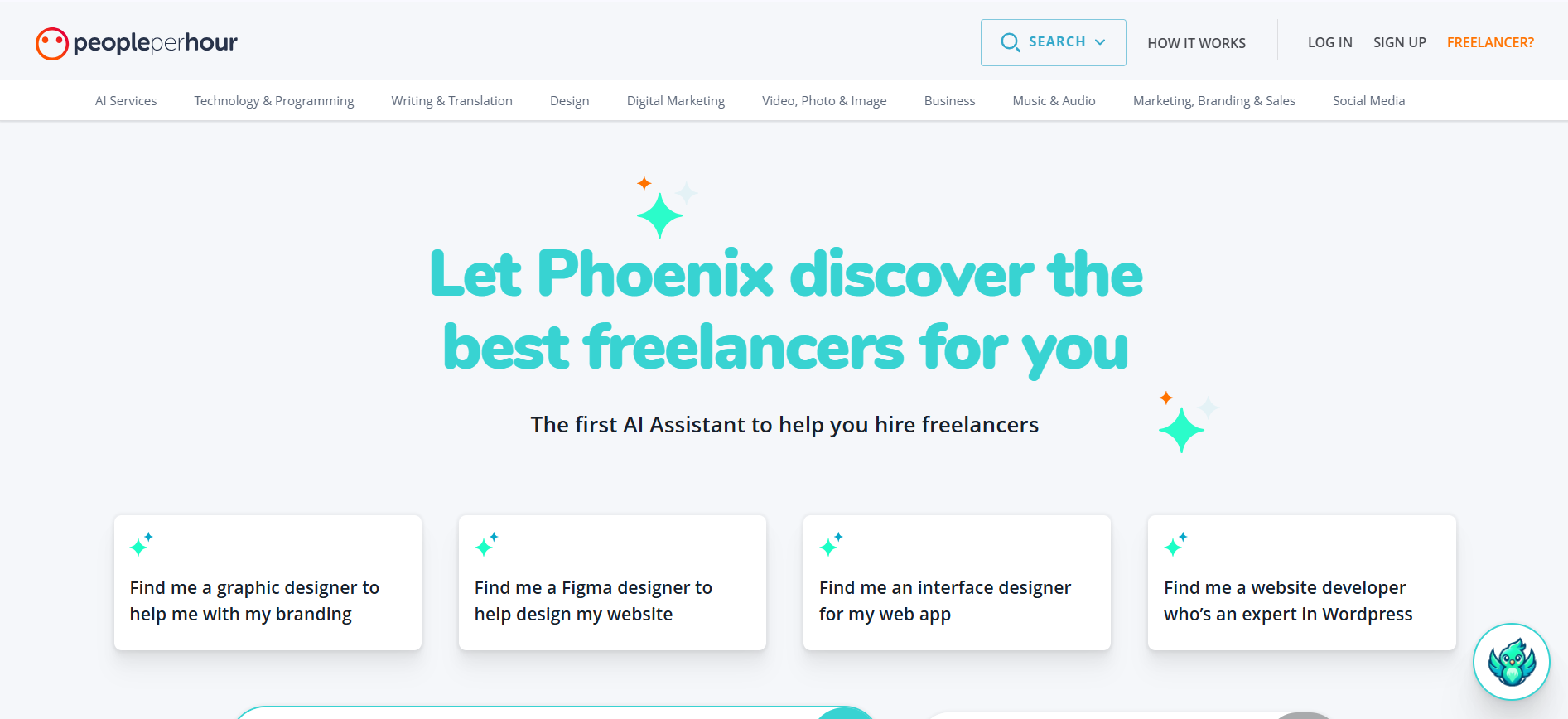
PeoplePerHour connects you with businesses needing short-term help from digital marketers, designers, and web developers. You can send 15 proposals each month for free, but sending more requires buying extra credits.
Pros:
- Flexible payment options to fit your work style
- Secure payments through the platform’s escrow system
- “Hourlies” feature for quick, predefined tasks
Cons:
- High service fee (up to 20%)
- Steep competition for projects
Unique features:
- Built-in project stream for easy communication and payment tracking
- Diverse job categories for both new and experienced freelancers
What freelancers are saying:
“I love how easy it is to communicate with buyers, the invoicing process, and the fact that my money is usually protected. The UX is simple and easy to navigate, and there are a good number of options for finding jobs and selling your work. Payment is incredibly fast, and I can have it in my PayPal account the same day.” — Adrienne H., Freelancer
11. Guru
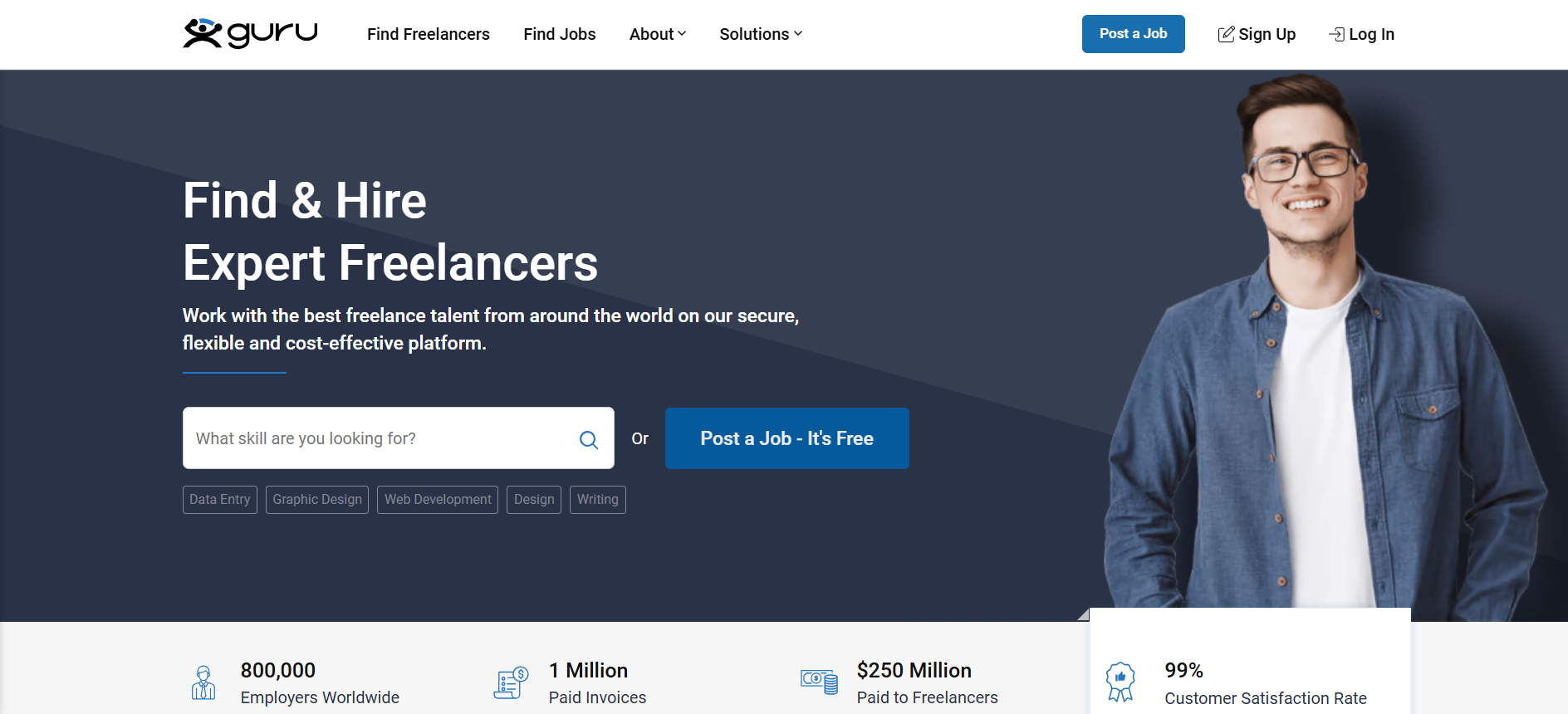
Guru is a platform for freelancers in web development, design, and admin support. You can create a profile to showcase your skills, submit bids at your rates, and rely on SafePay for secure payments.
Pros:
- SafePay ensures you receive secure payments
- Flexible payment options give you control over how you get paid
- Built-in project management tools
Cons:
- Tough competition for new freelancers
- A handling fee of 2.9% on the invoice value
Unique features:
- Built-in project management tools to streamline your workflow
What freelancers are saying:
“Guru is great if you are a freelancer looking to connect with clients to get projects, but it is not for people looking for a steady flow of work or a more permanent employment situation.” — Sarah Roscoe, Project Manager
12. Freelancer.com
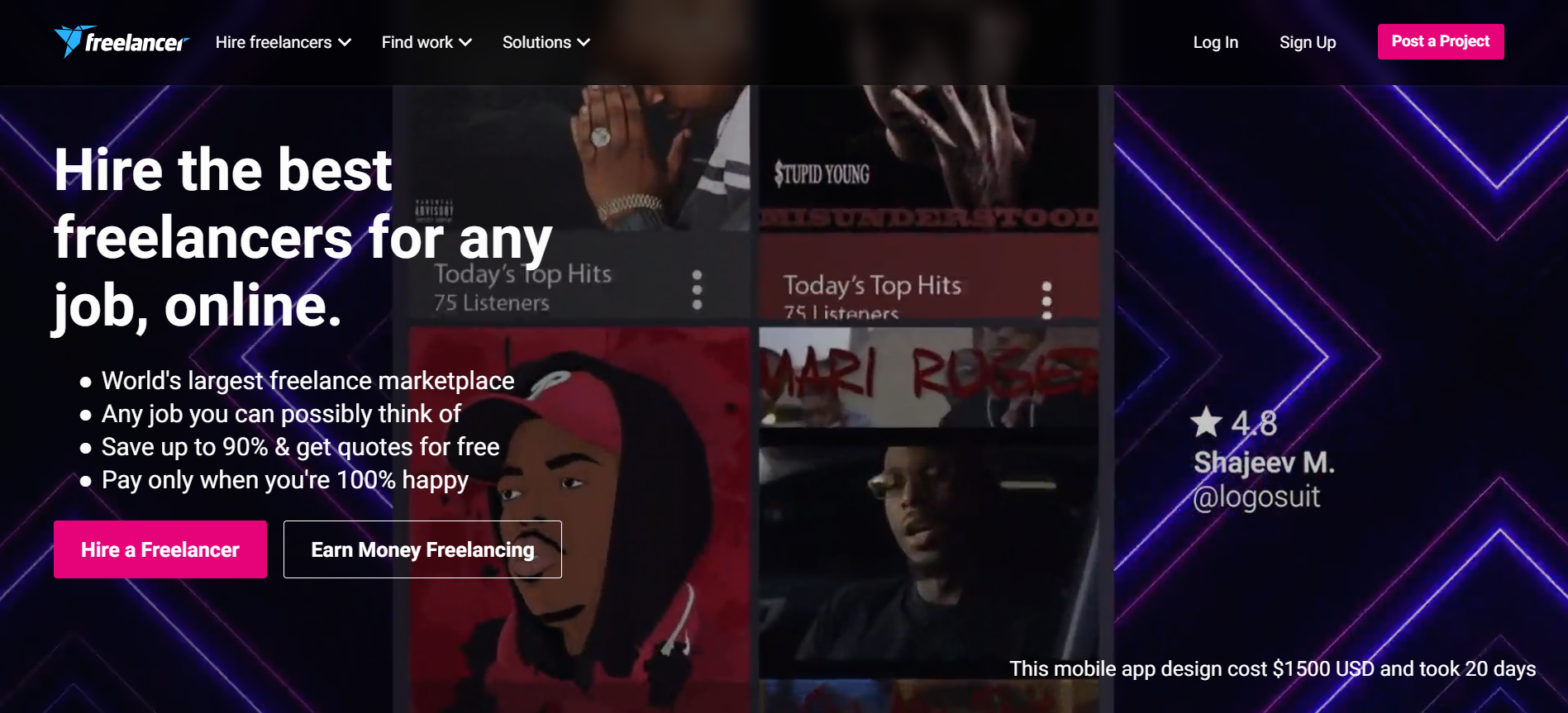
Freelancer.com offers opportunities in many industries with milestone-based payments. You’ll compete for jobs by submitting proposals in its bidding system.
Pros:
- Wide variety of job categories and a global client base
- Milestone payments ensure you’re paid securely throughout the project
- Contest feature allows demonstrating skills
Cons:
- Up to 15% service fee
- Challenging for beginners to secure gigs due to the high competition
Unique features:
- The bidding system allows freelancers to compete based on price and skills
- The public clarification board allows freelancers to ask questions about projects
What freelancers are saying:
“I can say that Freelancer.com is one of the best freelance web sites where you earn, learn and meet a nice and friendly people all over the world. I also can say that Freelancer.com has changed my life, and I am very grateful to you and your help. Wish you long life.” — MD Ahsan Habib, Graphic Designer
13. Wellfound (formerly AngelList Talent)
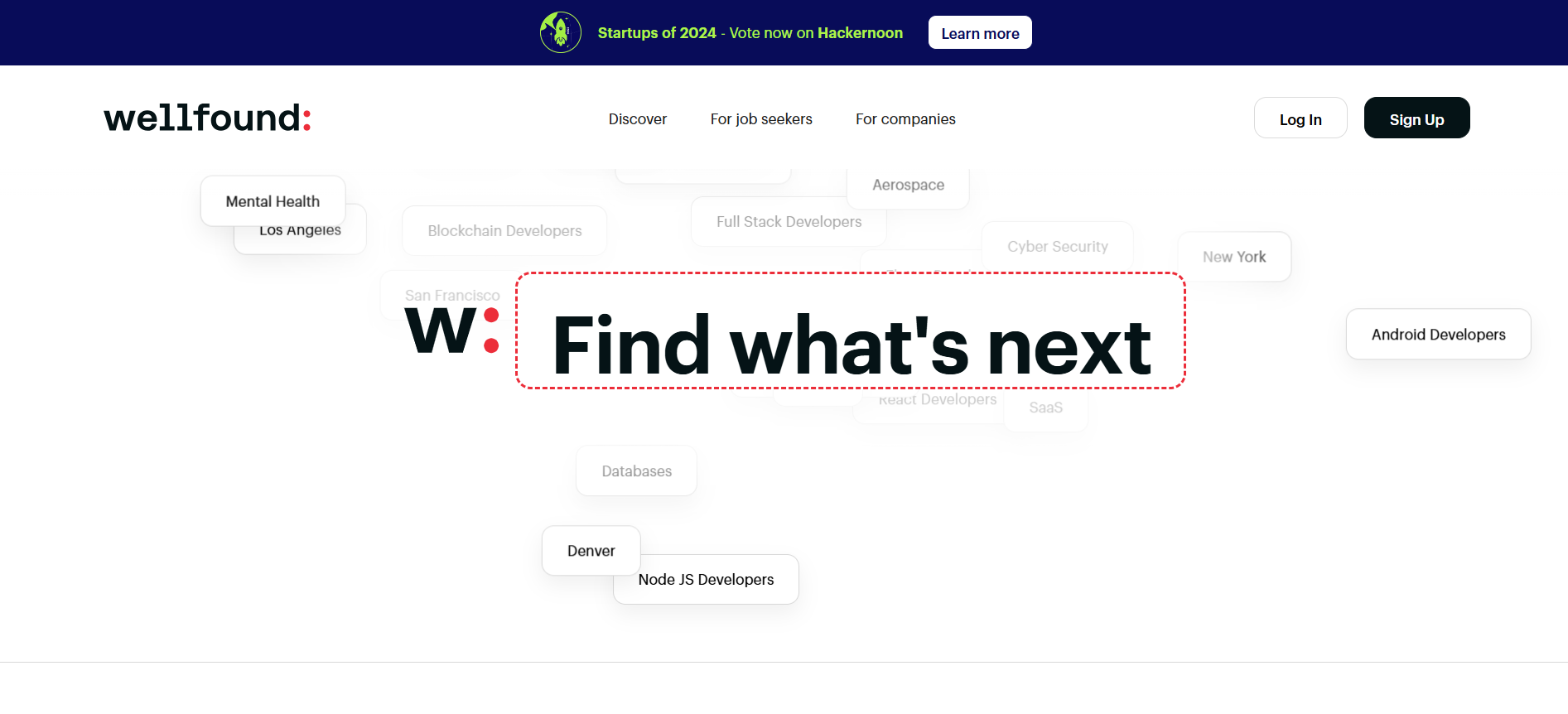
Wellfound connects you with tech and startup projects. Once your profile is set up, you can apply for jobs with a single click, keeping the hiring process fast and simple.
Pros:
- Access to a large network of innovative startups
- Transparency in salary and equity options in job listings
Cons:
- Only for tech and creative roles, not for non-tech industries
- Favors experienced professionals, limiting opportunities for beginners
Unique features:
- Direct connection with startup founders for quicker hiring
- One-click job application after profile setup
What freelancers are saying:
“Tons and tons of companies reached out. It’s great because you can filter down by seed round, funding, company size; it really felt like it was made for me specifically.” — Helen., Engineering Lead
14. DesignCrowd
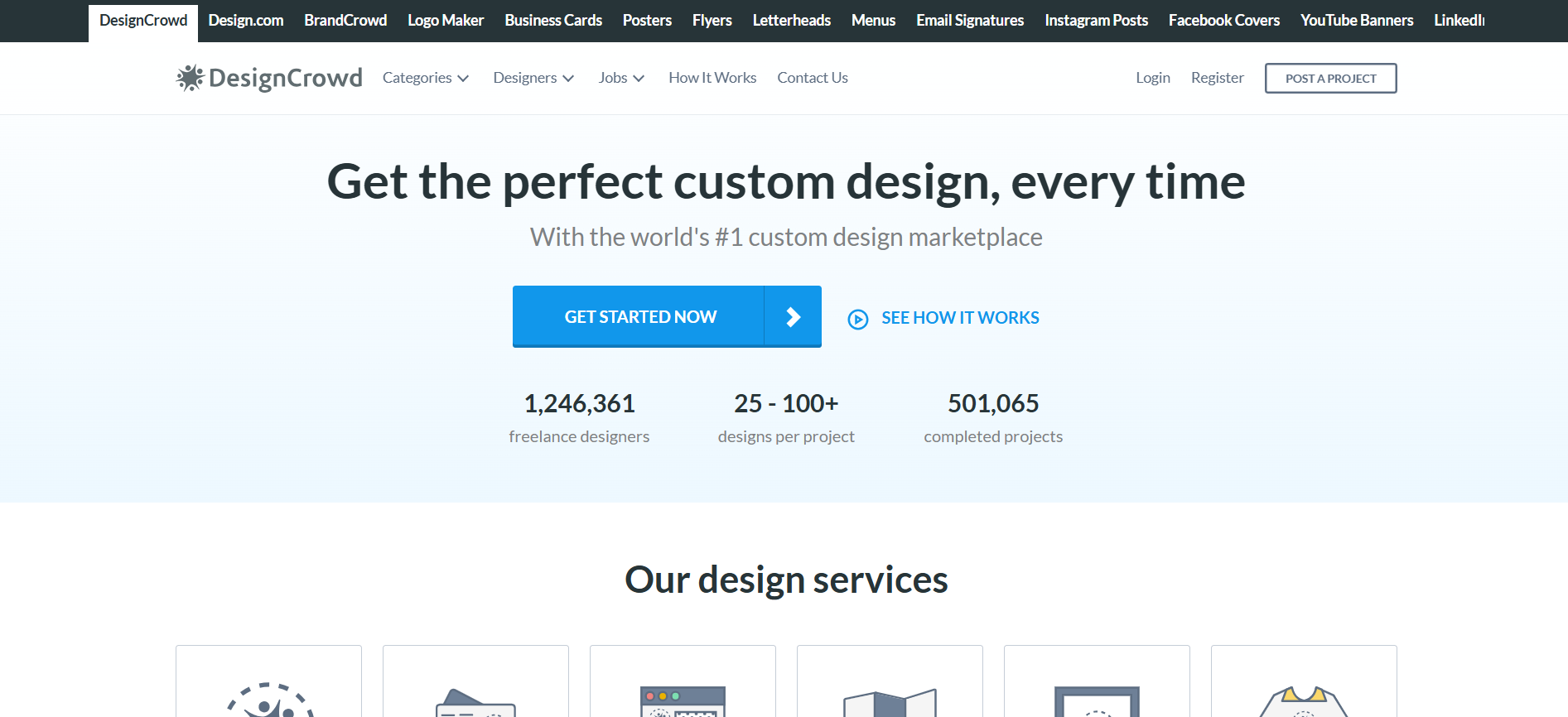
DesignCrowd lets you showcase your creativity as a designer. You can join design contests or get hired directly by clients worldwide, giving you flexibility in how you work.
Pros:
- Build your portfolio with diverse design projects
- Flexible options for quick design contests or direct hires
Cons:
- No guaranteed payment for graphic designers unless their work is chosen
- Freelancers may waste time if their design isn’t selected
Unique features:
- Contest-based design submissions give clients multiple creative options
- Work on various design categories globally
What freelancers are saying:
“I have been working on Designcrowd as a freelance designer, and my experience has been excellent. The support team is always responsive and helpful, making the entire process smooth and efficient.” — M Kareshki, Designer
15. 99designs
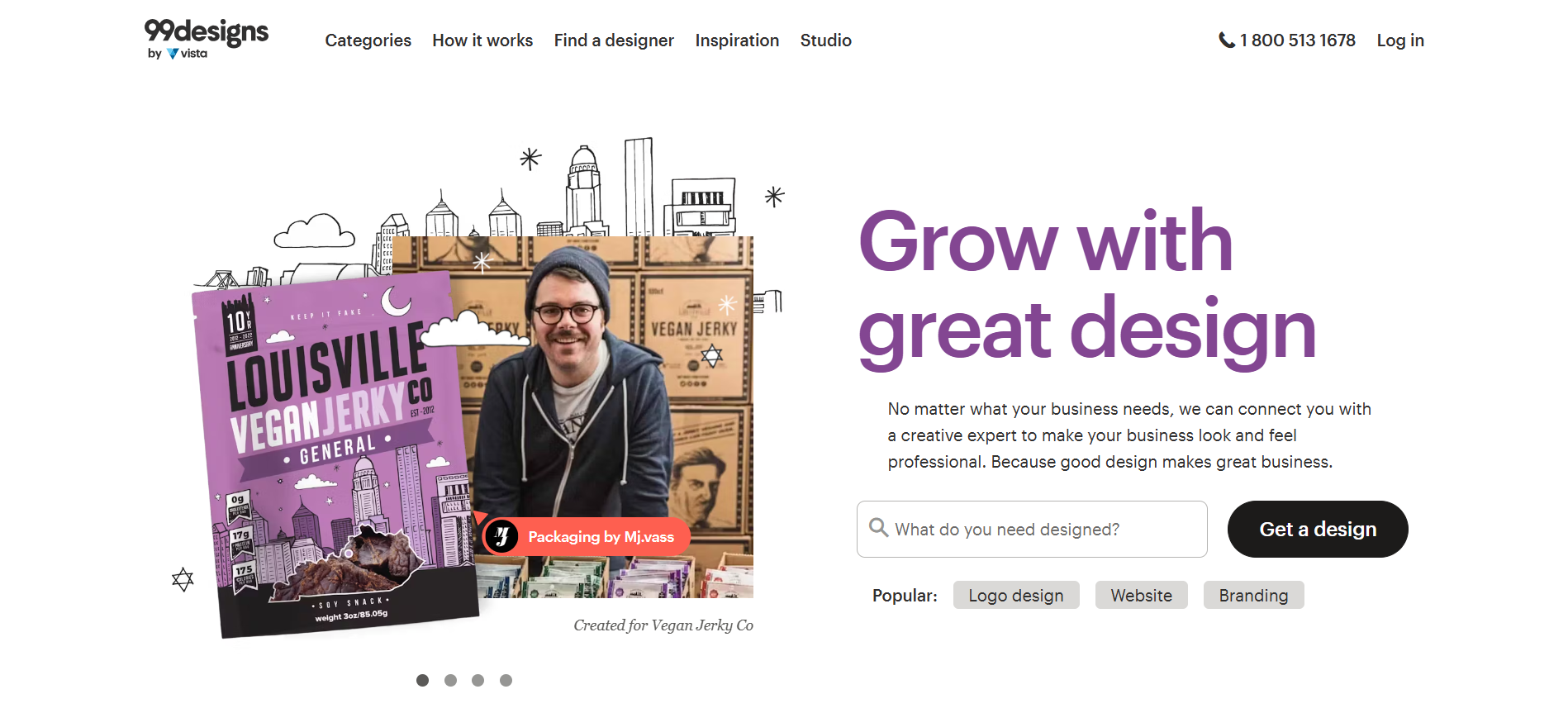
99designs is a platform for freelance branding experts, logo designers, and web designers. You can join contests or get hired for one-on-one projects, making it ideal for specialists in branding, web design, and other creative fields.
Pros:
- Flexible pricing, allowing you to set rates for direct hiring
- Opportunities to showcase your work through multiple design submissions
Cons:
- Up to 15% service fee and $100 introduction fee when you acquire a new client
- Contest participation fees are expensive
- You only get paid if your design is selected
Unique features:
- Design contests allow you to compete with other freelancers and showcase your creativity.
- Focus on professional, high-quality designs to improve your portfolio and attract more clients.
What freelancers are saying:
“99designs enables me to work on what I love with a creative freedom that I never had while working for agencies.” — Bella, Designer
16. Working Not Working
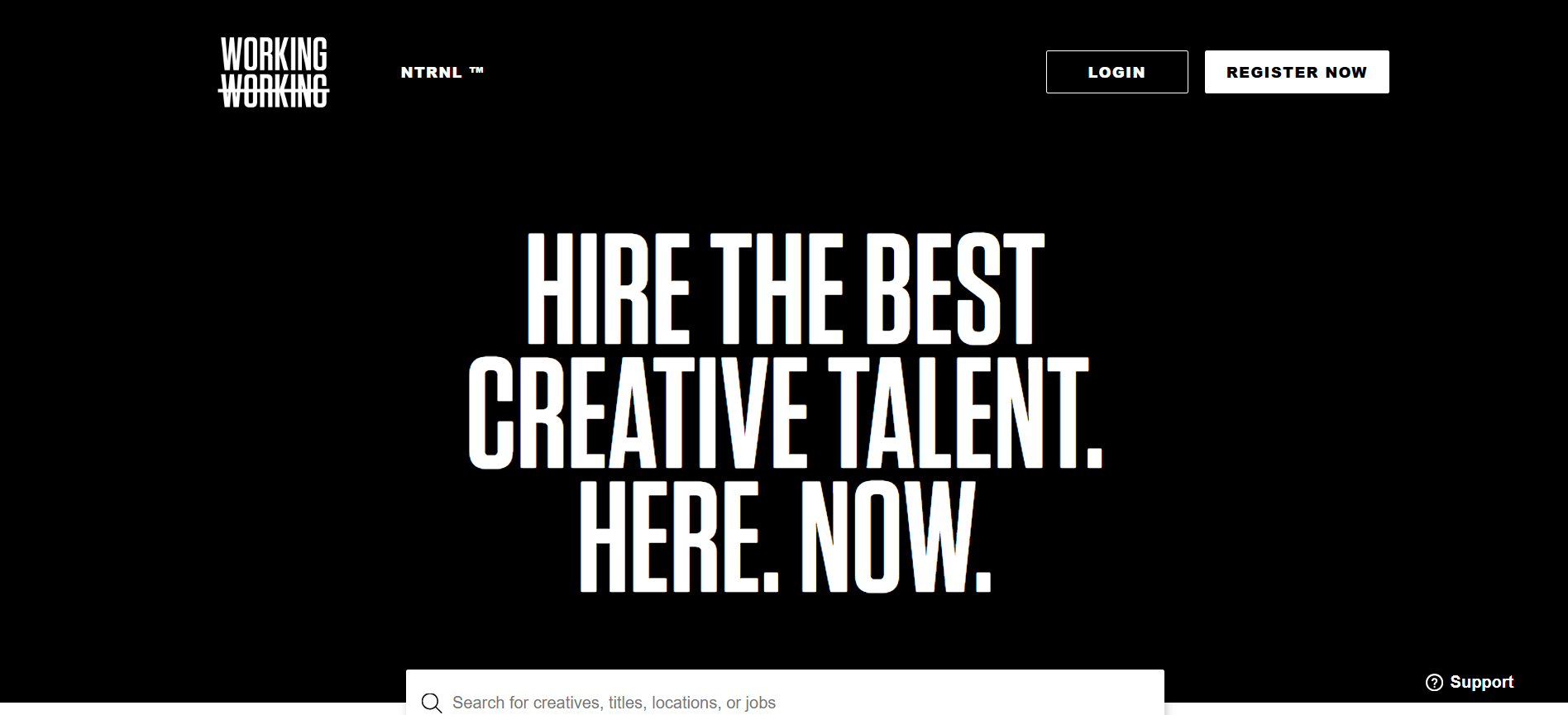
Working Not Working is an exclusive platform that connects you with high-profile brands and agencies. It’s ideal for freelancers in design, marketing, and other creative fields, allowing you to work with global brands.
Pros:
- Opportunities to work with brands like Google, Apple, and Airbnb
- Selective platform with high-quality job listings
- Strong community of experienced creatives
Cons:
- Difficult entry for newer or less-experienced freelancers
- Fewer job listings compared to general freelancing sites
- Long wait time for profile approval
Unique features:
- Community-driven focus on building long-term client relationships
17. Webflow Experts
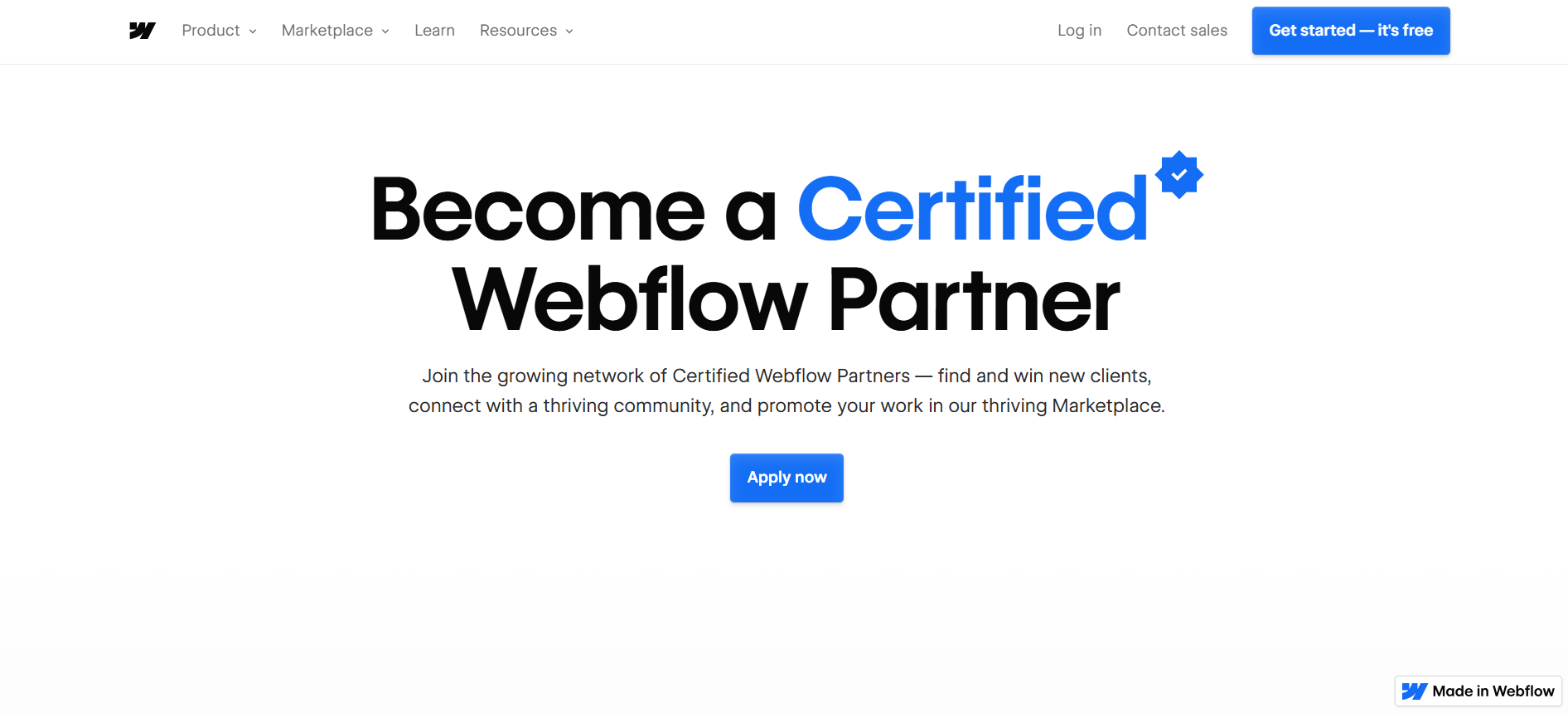
Webflow Experts connects you with clients who need help creating, customizing, and launching websites in Webflow. It’s ideal if you specialize in high-quality web design projects.
Pros:
- Vetted opportunities ensure quality projects
- Focus on Webflow gives you a niche advantage
Cons:
- Only caters to Webflow experts, limiting broader web development opportunities
- Smaller pool of available projects due to specialization
Unique features:
- Connect with clients seeking Webflow specialists
- Vetted projects for high-quality freelance opportunities.
What freelancers are saying:
“Webflow has enabled me to step up the type of clients I’m getting where I can really deliver on both halves.” — Joseph Berry, Web Designer
18. YunoJuno
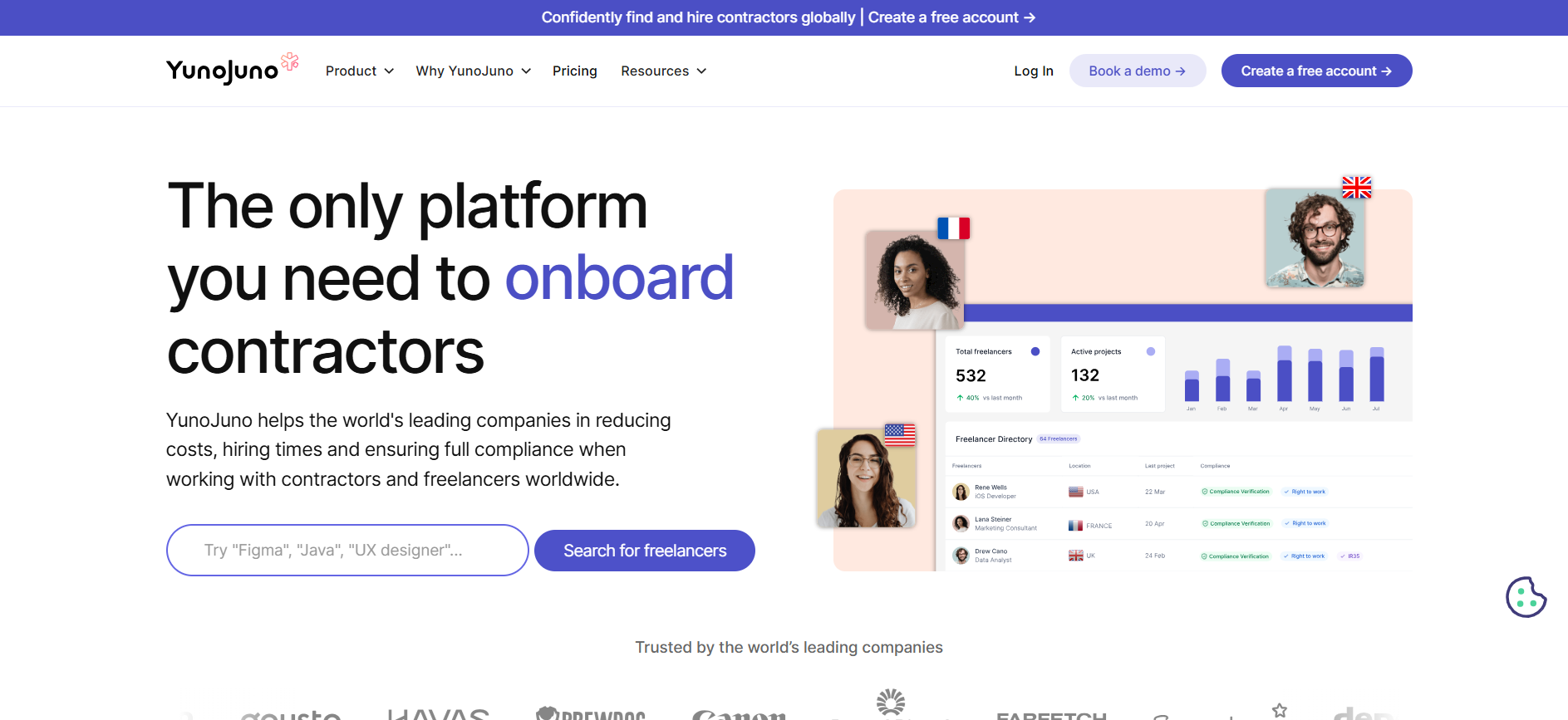
YunoJuno connects you with high-quality projects from top companies and brands looking for skilled developers, designers, marketers, and project managers.
Pros:
- Access to premium job listings from reputable companies
- Project management tools, including contracts and invoicing
- Focus on building long-term relationships between freelancers and clients
Cons:
- Tough vetting process for freelancers
- Geared toward experienced professionals, with fewer opportunities for beginners
Unique features:
- Access to a supportive freelancer community
- Automated timesheets for effortless tracking
What freelancers are saying:
“YunoJuno are by far first place for me. I’ve met incredible clients, had the chance to work on some really great brand projects and find the whole platform a breeze.” — Nick Kyriakides, Senior Post-Production Artist
19. Authentic Jobs
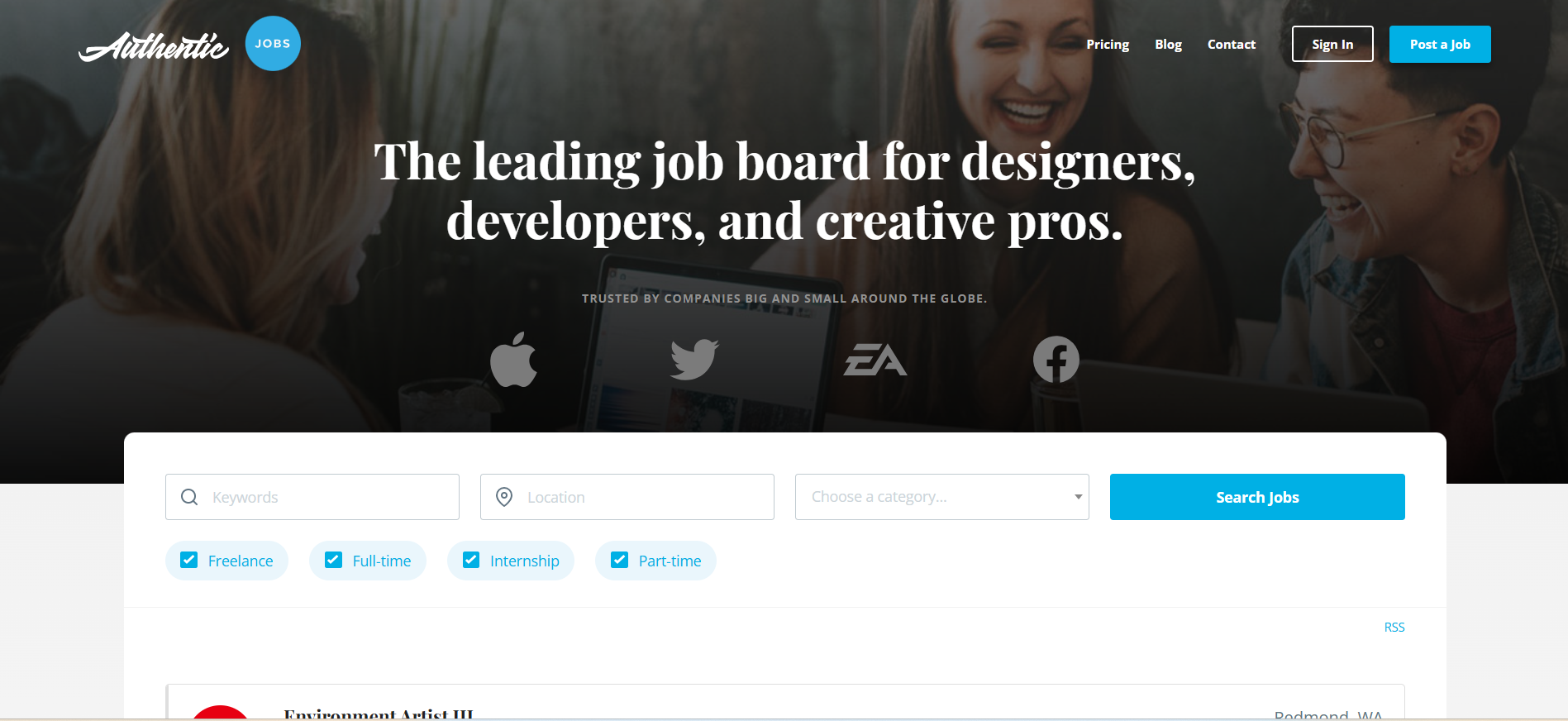
Authentic Jobs is an online job board for creative and technical roles, especially in design, development, and UX. Its high-quality listings protect you from scams and help you find quality gigs
Pros:
- Quality job offers from well-known companies like Uber and OpenAI
- Specializes in freelance opportunities in design and tech
- Trusted platform within creative industries
Cons:
- Mainly caters to senior professionals, limiting entry-level opportunities
- Freelancers may find it hard to find short-term contracts
Unique features:
- Strong focus on design and UX roles
20. TaskRabbit
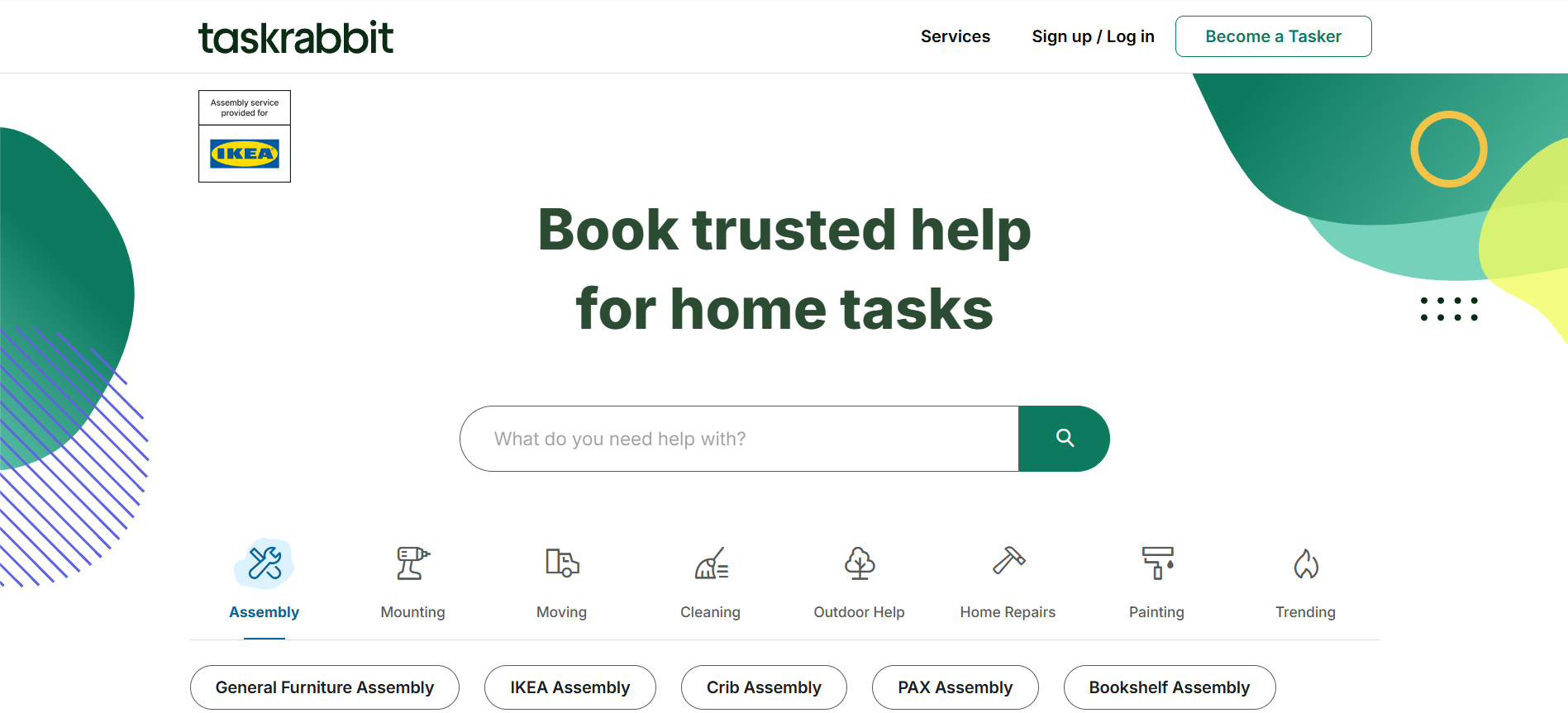
TaskRabbit connects you with local clients who need help with everyday tasks like moving, furniture assembly, or home repairs. It’s made for in-person services in cities.
Pros:
- Flexible scheduling for freelancers (Taskers)
- Easy-to-use payment processing for both freelancers
- Great for quick, local jobs
Cons:
- Limited to local, in-person work, with no remote options
- Service fees can cut into your earnings
Unique features:
- Focus on local, in-person services rather than remote work
- Full control over your schedule and service areas
What freelancers are saying:
“Good working experience, I would recommend it. It has great flexibility working, and it is a good part-time gig. Set your own hours and pay. Many different jobs to do on the app” — Verified tasker from New York
21. FlexJobs
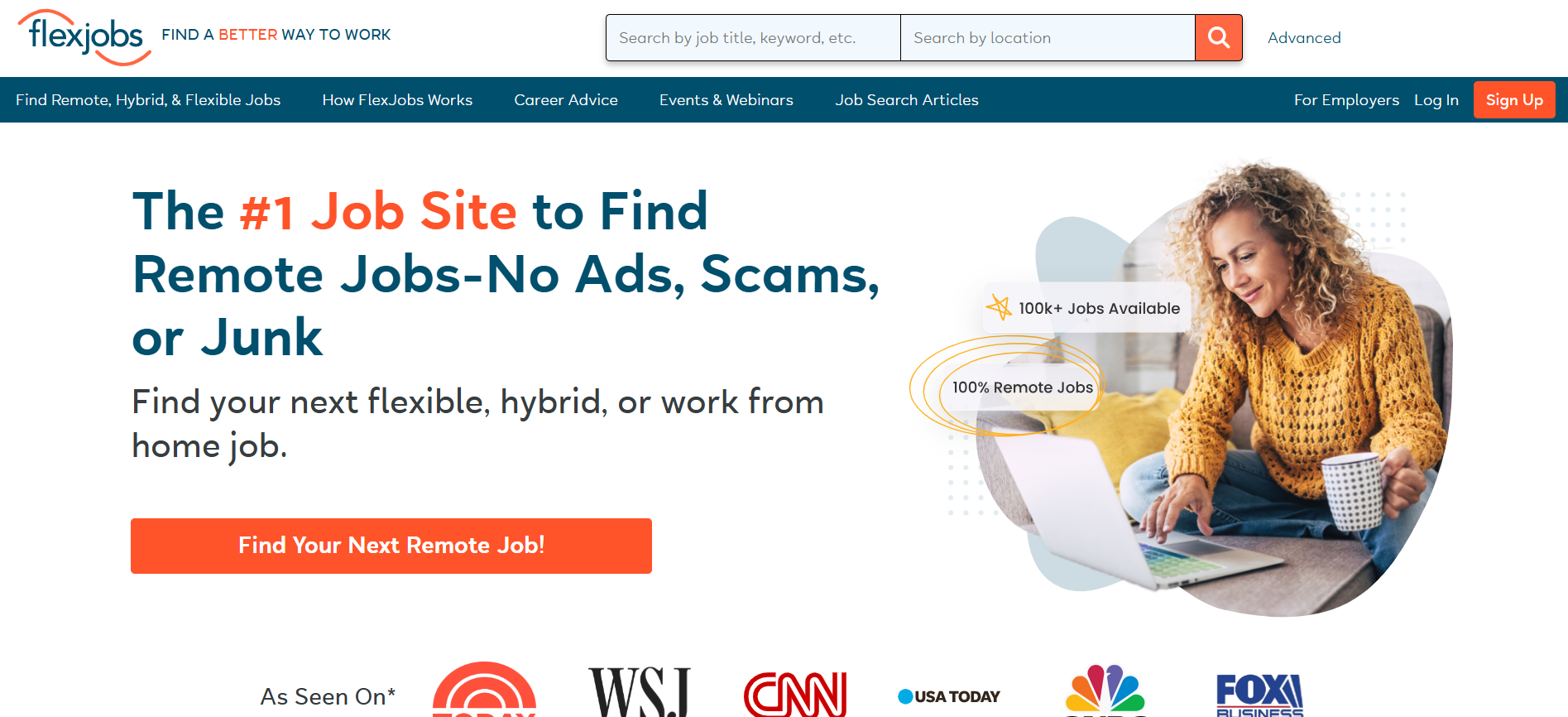
FlexJobs is a vetted job board for remote, flexible, and freelance work across various industries. Each listing is screened to help you find high-quality, scam-free jobs.
Pros:
- Strict job vetting process guarantees scam-free job vacancies
- Wide variety of industries and flexible job types
- Ideal for people looking for long-term jobs and flexible working hours
Cons:
- Requires a subscription fee to view listings
- Fewer short-term freelance gigs compared to other freelance platforms
Unique features:
- Focus on remote and flexible work opportunities
- Access to exclusive webinars and coaching
What freelancers are saying:
“FlexJobs is easy to navigate and has a lot of great tools. I’m so glad I took a chance and bought a membership. I needed to find another flexible, work-from-home position.” — Michele H, Online Moderator @ Kaplan
22. SolidGigs
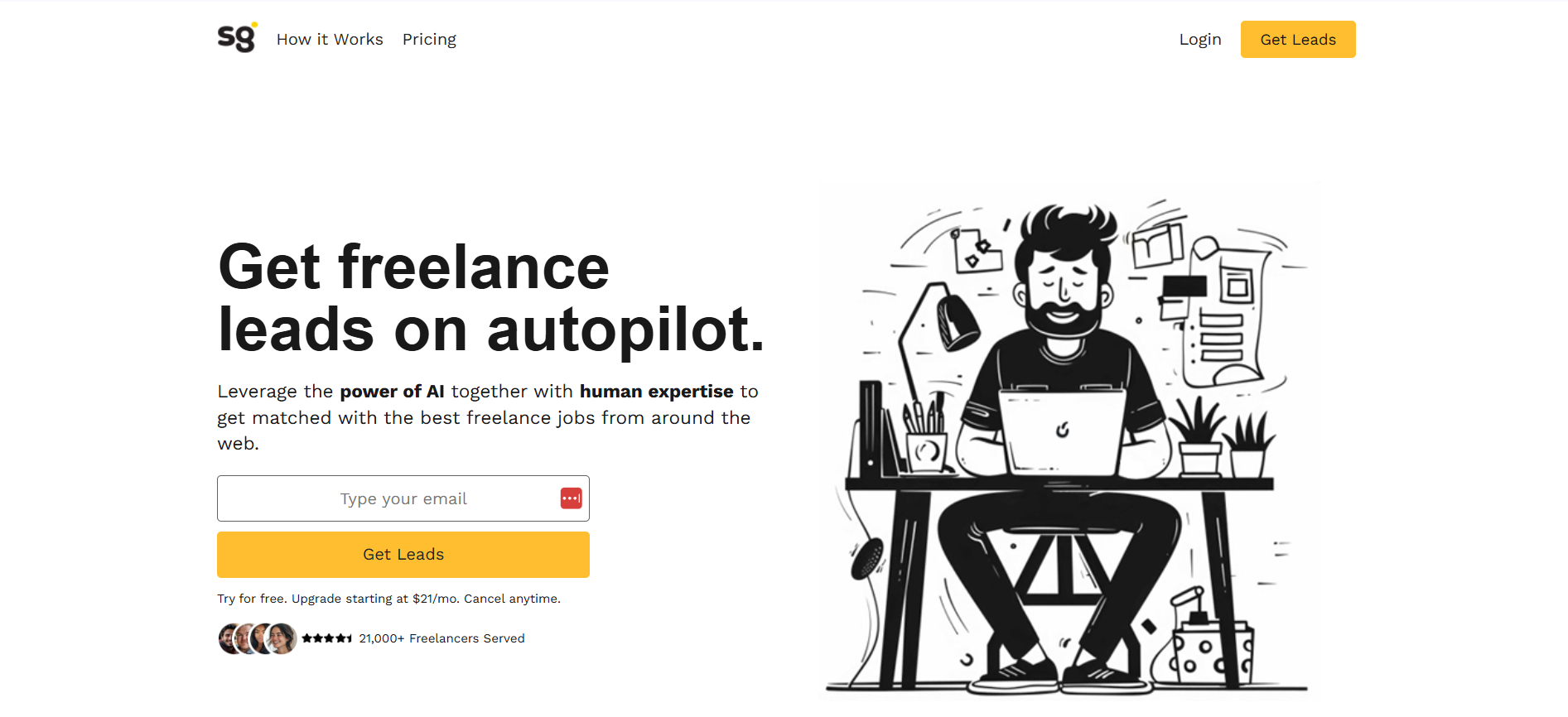
SolidGigs is a subscription platform that sends hand-picked freelance job leads straight to your inbox, saving you time on job searches.
Pros:
- Curated job leads sent daily to save time
- Focus on high-quality, vetted job leads
Cons:
- A monthly subscription fee of up to $49 can be a barrier for new freelancers
- Freelancers still need to secure the job themselves after receiving the leads
Unique features:
- Keep 100% of your client payments
What freelancers are saying:
“The projects on Solidgigs are from more established brands compared to what I have experienced on other online freelancing platforms – the quality is better!” — Chris, Freelancer
23. Flowremote.io
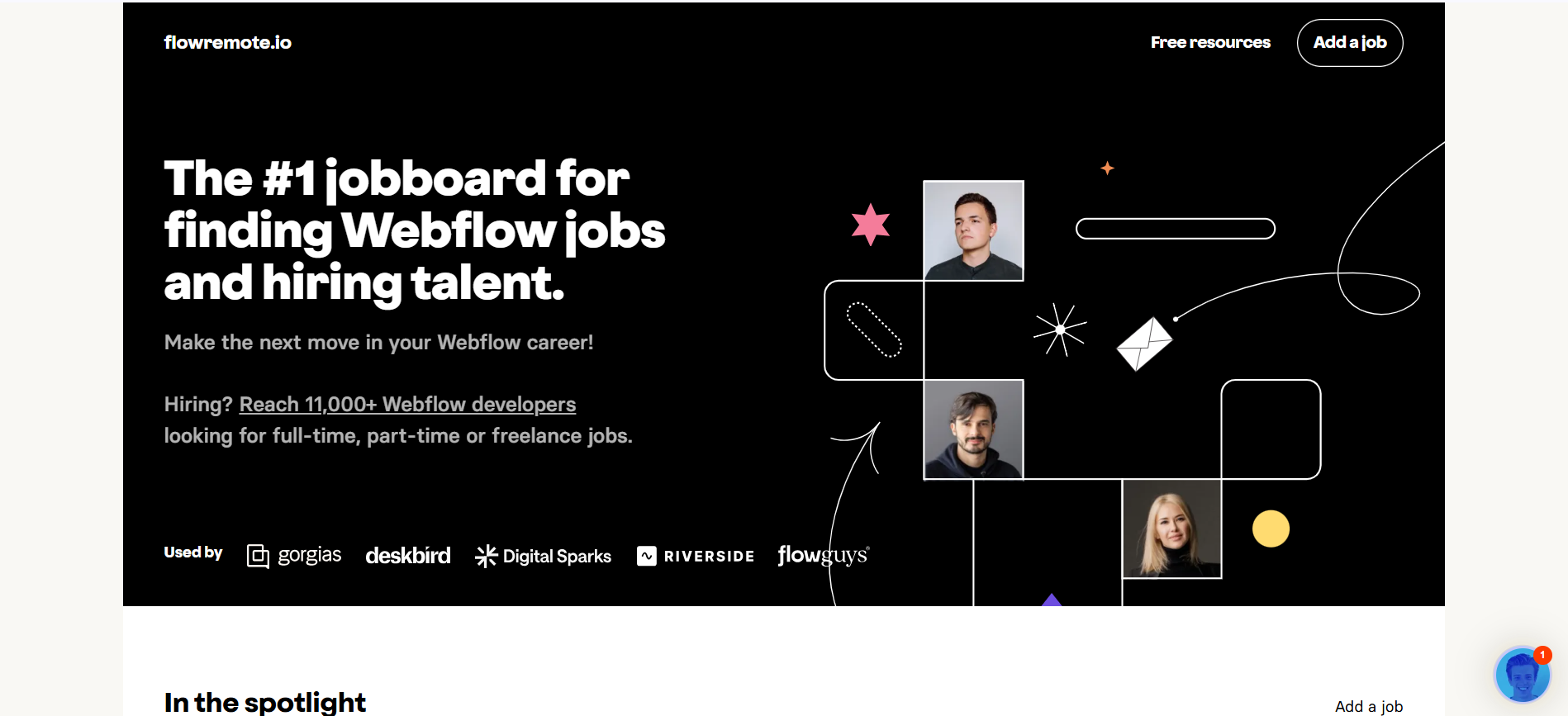
Flowremote.io features remote opportunities for Webflow designers and developers, connecting you with businesses needing expertise in creating, customizing, and launching websites.
Pros:
- Curated listings from trusted tech companies
Cons:
- Limited job categories outside of tech
- Requires subscription for fresh job updates
- Fewer listings compared to bigger freelance platforms
Unique features:
- Daily updates with fresh job listings
24. LawClerk

LawClerk connects you with law firms seeking legal expertise for specific projects. This specialized platform for legal professionals lets you take on legal work without a full-time commitment.
Pros:
- Access to legal projects without needing a full-time commitment
- Flexible, project-based work for lawyers
Cons:
- Only for legal professionals, excluding other fields
- Earnings can vary based on available projects
Unique features:
- Choose between project-based or subscription work
- Work remotely with flexible scheduling options
What freelancers are saying:
“Easy to use, many opportunities for jobs, friendly customer service.” — Freelancer
25. Bark
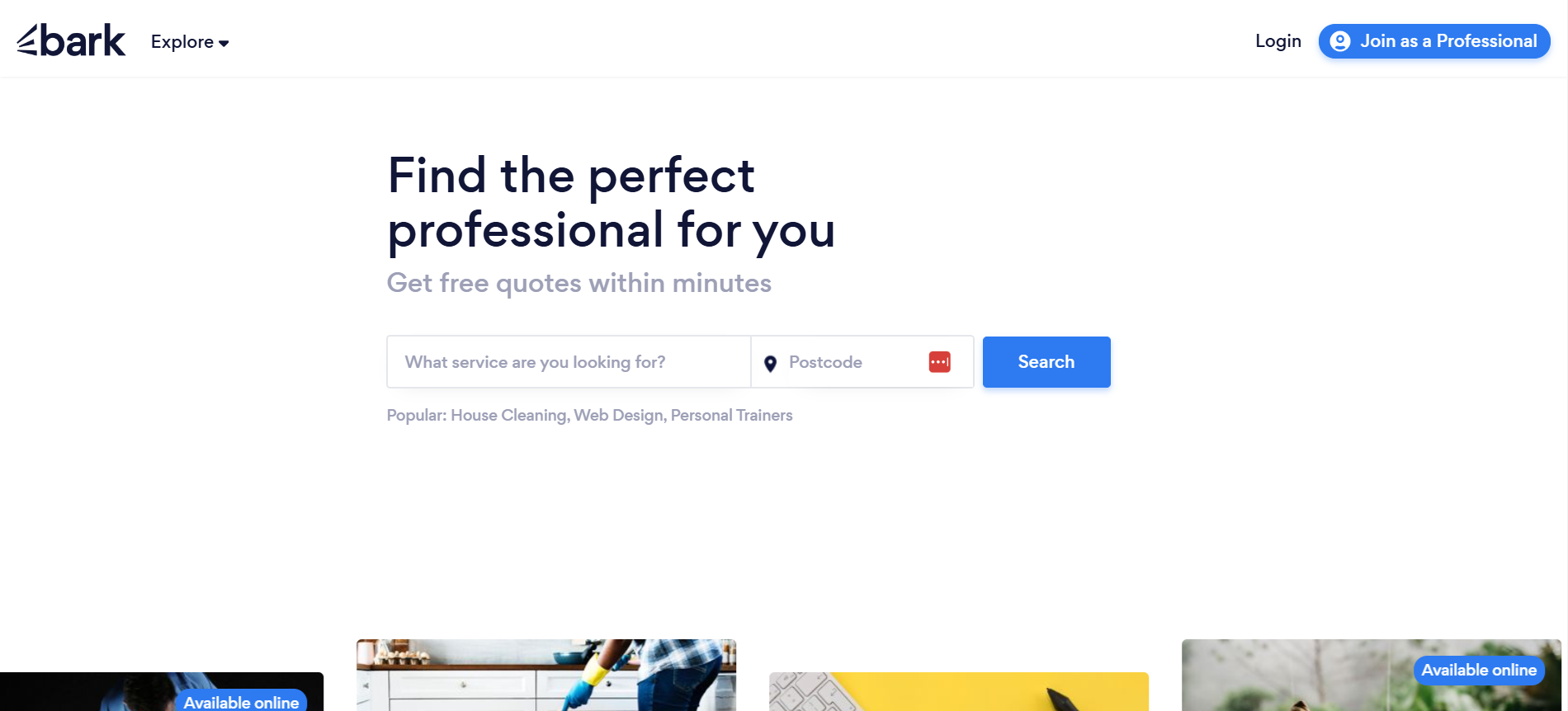
Bark connects you with clients looking for personal services like health, fitness, and lifestyle coaching. You can bid on projects or receive direct requests from clients.
Pros:
- Flexibility to set rates and choose projects
- Opportunity to offer local, personal services
Cons:
- High competition may lower prices
- Bark charges a service fee per client connection
Unique features:
- Instant access to job leads
What freelancers are saying:
“Bark is a brilliant platform for my profession. Every week there is hundreds of new leads that I can access. The app is extremely useful and easy to use.” — Emily L., Service Provider
26. WriterAccess
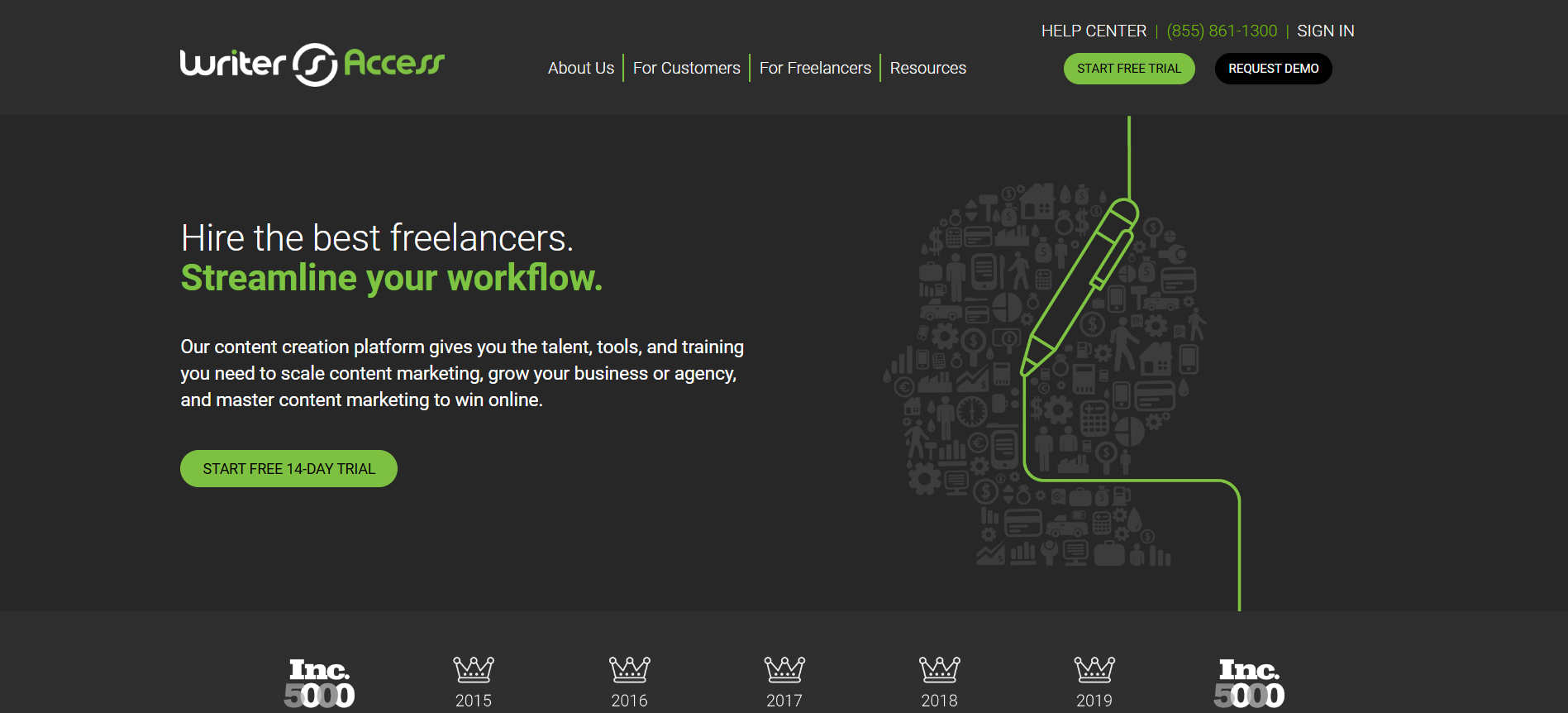
WriterAccess helps you find writing jobs, like blogs, articles, and content across industries. You can advance to higher levels based on client feedback and your performance.
Pros:
- The tiered system allows writers to earn more as they build their reputation
- Strong focus on content quality and professional growth
Cons:
- Competitive, making it hard to get high-paying jobs at first
- WriterAccess retains 30% of freelancer earnings
Unique features:
- Access to content marketing training
- AI-powered talent matching for preferred job match
What freelancers are saying:
“WriterAccess has allowed me to scale up my online publishing business without losing the quality my readers expect.” — Eric Apalategui, Writer
27. Voices
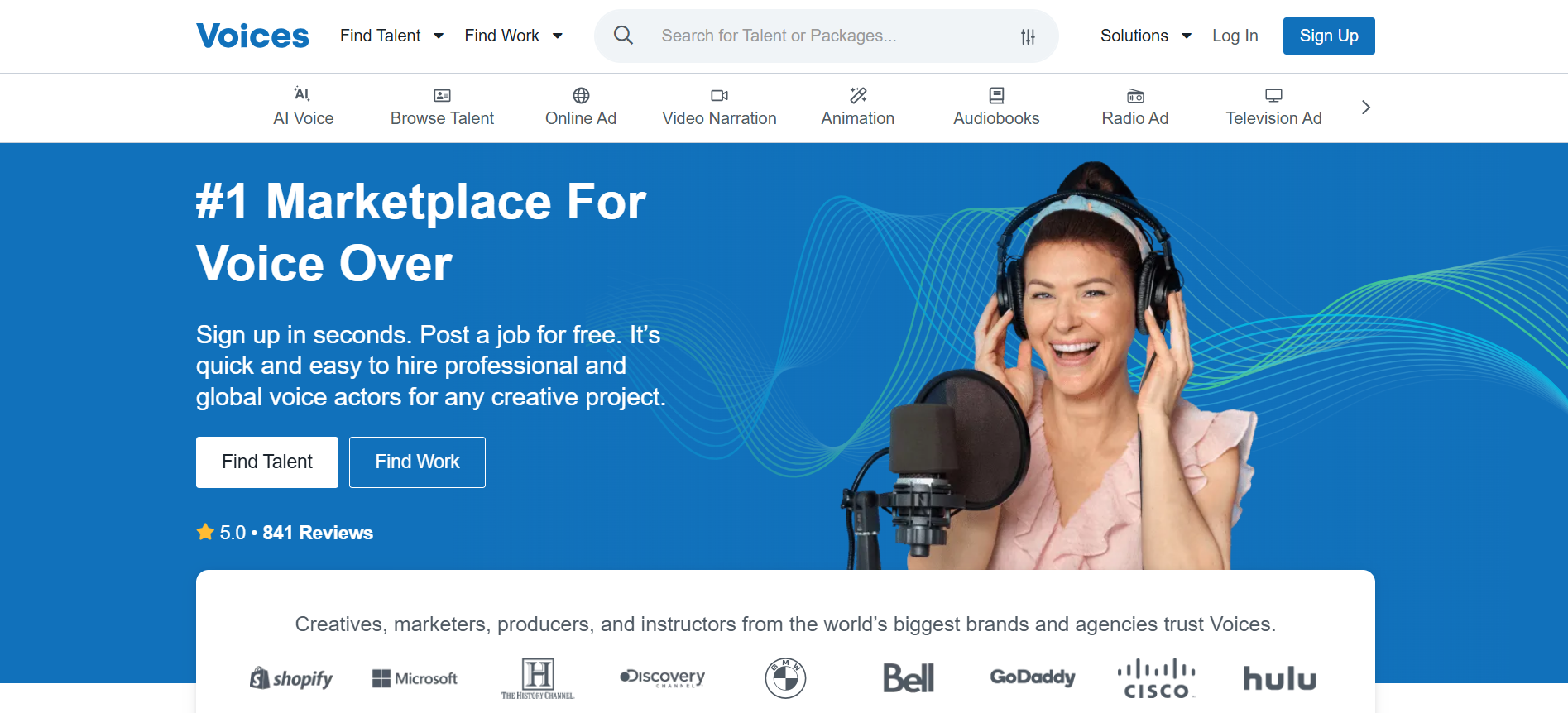
Voices is a platform where you can connect with clients looking for voice talent for projects like commercials, audiobooks, and video games.
Pros:
- Secure payment system ensures freelancers get paid
- High-quality job offers in specialized areas like audiobooks and commercials
Cons:
- Premium membership is required to access all features
- Highly competitive, with many artists competing for the same roles
Unique features:
- Focus on voiceover jobs, providing tailored opportunities for voice talent
- Tools for managing auditions, contracts, and payments
What freelancers are saying:
“Voices allows me to make all the big decisions. I get to decide what auditions I do. I get to decide how much I should be paid.” — Jackie Mahon, Voice Actor
28. Kolabtree

Kolabtree connects you with businesses and academic institutions seeking expertise from scientists, researchers, and specialists. It focuses on scientific consulting, research, and data analysis.
Pros:
- Flexible consulting roles, ranging from short-term to long-term engagements
- Ideal for tackling complex projects that demand expert-level knowledge
Cons:
- Fewer project opportunities compared to broader freelance websites
- Focuses on niche areas like science and academia, which may not suit all freelancers
Unique features:
- Focus on high-level scientific expertise
- Great for freelancers seeking expert-level roles in research and data analysis
What freelancers are saying:
“I started working at kolabtree two years ago, it has been a great experience. I’ve met with some excellent clients. Any issue was resolved by the support team as fast as possible. Overall it’s an incredible journey.” — Nare Simonyan, Freelancer
29. Hireable
Hireable is a freelance website and job board that connects you with businesses looking for talent in writing, design, development, and marketing.
Pros:
- Simple interface with a variety of job opportunities
- Filters help find relevant opportunities based on category, location, or contract type
Cons:
- High competition, especially for beginners
- Freelancers need a strong portfolio to stand out
Unique features:
- Wide range of job categories for different skill levels and industries
How to choose the right freelance platform for your needs
As the gig economy grows, freelancers have more platforms to connect with clients in different industries. However, not every platform is right for every freelancer. Choosing the best freelance websites means looking at what jobs they offer, what kind of clients use them, how easy they are, and the fees they charge.
Here are some things to consider when choosing the platform that matches your goals.
Industry specialization
Consider whether the platform focuses on your industry. Some platforms offer a wide range of freelance jobs, while others focus on specific fields. Here’s a breakdown of platforms based on their industry:
Software development and tech
Arc, Toptal, and Upwork offer opportunities for tech professionals. While each platform has unique features tailored to different types of freelancers, all help freelance software developers find suitable gigs.
Design and Creative Fields
Behance, Dribbble, and 99Designs are great for showcasing design portfolios. These platforms allow designers to display their work and facilitate networking with potential clients and collaborators.
Writing
WriterAccess and Upwork are great for freelance writers. WriterAccess focuses on content creation, while Upwork offers freelance writing and other freelance jobs.
Niche fields
Flowremote, Bark, Webflow Experts, Kolabtree, LawClerk, and Voices focus on specialized niches. Each platform serves specific professional fields, connecting freelancers with clients who need specialized skills and services.
Client type
Different platforms attract clients, from startups to large corporations and small businesses. Knowing your ideal client will help you pick the right platform:
Startups and early-stage companies
Platforms like Arc and Wellfound focus on connecting freelancers with startups. By facilitating direct communication with hiring managers and offering tailored job matches, these platforms help freelancers secure roles that meet their professional goals and provide growth potential.
Large corporations
Toptal and Upwork are ideal for larger projects with major corporations. These platforms have distinct offerings but provide great opportunities for freelancers to work on large-scale projects with well-known companies.
Small businesses and local clients
Platforms like TaskRabbit and Bark are better if you prefer working with local companies or smaller businesses. TaskRabbit is better for local, hands-on work, while Bark connects clients with personal services like fitness training.
Platform usability
The ease of use of a platform can greatly impact your experience, especially when managing multiple clients or projects. For example, Arc offers personalized support and vetting to help you stand out. Meanwhile, Upwork and Fiverr provide mobile apps but don’t offer tailored freelancer support. For creatives, platforms like Behance and Dribbble are excellent for showcasing work. Designed for visual artists, these sites make it easy for clients to discover and hire freelance talent.
Fee structure and payment methods
Understanding the fees and freelance payment methods can help you maximize your earnings. Each platform handles fees differently, so here’s a quick look:
Flat Rate Fees
Arc is free for freelancers, allowing you to focus on finding quality freelance work without worrying about fees cutting into your pay. In contrast, flat rate fees on platforms like Fiverr and PeoplePerHour can take a significant portion of freelancers’ earnings.
Tiered commission fees
Some platforms use tiered commissions, where fees decrease as you earn more with a client. For example, you might pay 20% initially, with lower rates as income grows. This benefits long-term projects but can mean higher fees for smaller or one-time jobs.
Premium memberships
Some platforms offer premium memberships. These give access to higher-paying jobs or exclusive clients. While they can cost more upfront, they may pay off with better opportunities.
Payment methods
Most platforms offer secure payment options like PayPal and direct local bank transfers. Some also provide escrow services, holding payments until project milestones are completed to ensure fair and timely pay.
How to spot fake job postings
Freelancers, especially new ones, can sometimes be tricked by scammers posting fake jobs. Knowing the warning signs and how to protect yourself is key to avoiding these scams.
Here’s a guide on spotting fake job postings, using platform tools to your advantage, and checking if a client is legitimate.
Red flags to watch out for
Recognizing the signs of a scam is the first step in protecting yourself. Some common warning signs include:
Unverified clients or companies with no reputation
Be cautious of clients with no verified profiles or history, as unverified clients could be potential scammers. Consider communicating directly with these clients before committing to any work to gauge their professionalism and reliability, as this can help protect you from potential issues.
Requests for upfront payments or personal information
Scammers often ask for deposits or personal details, so ensure all transactions use secure methods. Always verify the payment terms through the guidelines and use escrow services when available, as these steps protect your work and personal information.
Moving conversations off the platform
Be wary if a client wants to move communication off the platform. Communicating outside the platform can lead to disputes where you may lose access to support and mediation services, increasing the risk of misunderstandings or scams.
Jobs with vague details or unusually high pay
Scammers often post vague job opportunities with promises of unusually high pay to lure freelancers in. Legitimate clients will provide clear job details and realistic pay based on the work required. Always ask for specifics before committing to any project.
Platform tools that protect freelancers
Many freelance job sites offer tools to protect users from scams and ensure smooth project management. One key tool is escrow-based payment protection, where client funds are held until the work is completed. This system reduces non-payment risk, especially on long-term projects, by supporting milestone-based payments.
Platforms also offer dispute resolution services, tracking communication and project progress to resolve conflicts fairly. To benefit from these protections, freelancers should keep all interactions and payments within the platform, avoiding the increased risk of fraud when taking transactions off-platform.
How to verify client credibility
While platforms offer some protection, freelancers should take steps to verify a client’s credibility before starting a project.
Check reviews and ratings
Most freelance sites allow freelancers to leave reviews after projects. A client with multiple good reviews is likely trustworthy. Consider checking the details of those reviews for consistency and feedback on the client’s communication and payment practices.
Look for verified payment methods
Freelancing websites often allow clients to verify their payment methods, assuring freelancers that the client is financially capable of paying for the work. Avoid clients without verified details to prevent payment issues.
Check business information
Review a client’s credentials by looking at their website or LinkedIn profile. A client who claims to be established but lacks an online presence is a red flag. Also, verify any claims of past work or achievements, which can help you further assess their legitimacy and credibility.
Freelancing internationally: taxes, currency, and legal tips
Freelancing with clients from other countries is a great way to grow your freelancing business, make more money, and build a global reputation. However, handling payments, filing taxes, and navigating legal rules can be tricky across borders. Here’s how to manage these challenges:
Handling different currencies and payment methods
When working with international clients, payments in different currencies can affect your earnings due to conversion fees and transaction costs. Choosing the right invoicing software and payment platform helps minimize these expenses.
PayPal, Payoneer, and Wise are popular options with distinct features. PayPal charges 3-4% currency conversion rates and cross-border costs. Payoneer charges up to a 3.5% conversion fee and provides local bank details in various currencies. Wise, known for real exchange rates and low fees, is good for holding balances in multiple currencies, helping reduce conversion costs.
Minimizing costs
To minimize currency conversion costs, freelancers can hold balances in multiple currencies on platforms like Wise and Payoneer. This allows for better control over when to convert funds, helping avoid unnecessary fees.
Using local bank accounts is another effective strategy. Payoneer provides local account details in different currencies, making it easier for clients to pay without high international transfer fees.
Freelancers can also negotiate with clients to pay in their local currency or use services like Wise for better exchange rates, further reducing conversion costs and optimizing earnings.
Navigating tax laws for international freelance income
Tax-dealing can be complex for international freelancers, as rules vary based on location. For U.S.-based freelancers working with foreign clients, all global income must be reported to the IRS.
However, U.S. freelancers can claim the Foreign Tax Credit (FTC) if they’ve paid taxes in another country to avoid double taxation. IRS forms like 2555 or 1116 are typically used to report foreign income.
Some countries have tax treaties to prevent double taxation, so checking if one applies is important. Moreover, freelancers working with EU clients may need to comply with VAT rules if earnings exceed the threshold, making it wise to consult a tax professional for guidance.
Legal requirements
Following legal guidelines when freelancing internationally is crucial for protecting your work and ensuring payment. Always have a clear contract that outlines payment terms, deadlines, and intellectual property rights, as laws vary by country. Include clauses for late payments and dispute resolution to safeguard your interests.
To simplify contract signing and ensure legal validity, use digital tools like DocuSign or HelloSign. These platforms allow both parties to sign online, making agreements enforceable across most countries. Tools like PandaDoc also provide contract templates tailored for freelancers.
Building your freelance future with these key steps to success
These platforms can help you launch and expand your freelancing career. However, building a successful freelance career involves more than just picking the right platform. You need to choose one that fits your industry, avoid scams, manage international payments, and understand tax obligations. Clear contracts with international clients are essential for protecting your business and ensuring smooth transactions.
As you grow, focus on building a personal brand that showcases your skills to attract more clients. Using these platforms and adopting the right approach, you can launch a successful freelance career aligning with your expertise and goals.
Work the way you want from anywhere in the world 🌎
Find top freelance and full-time remote jobs.
Learn more about Arc →


